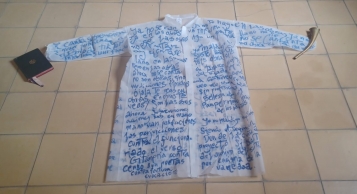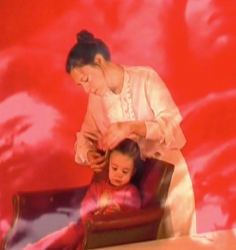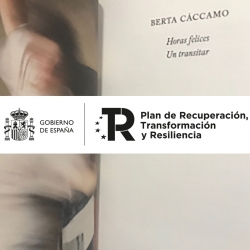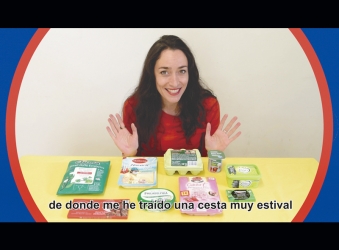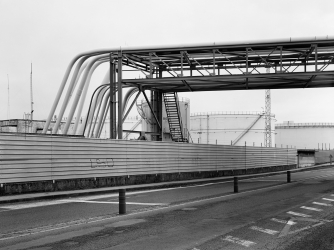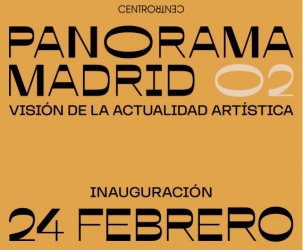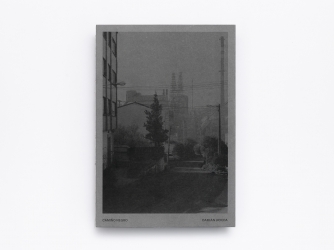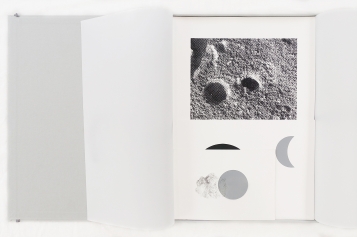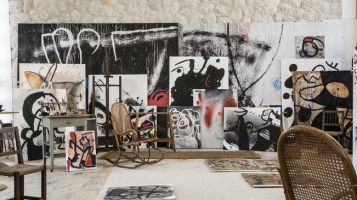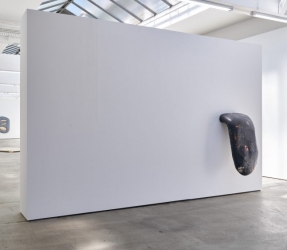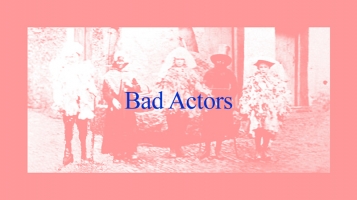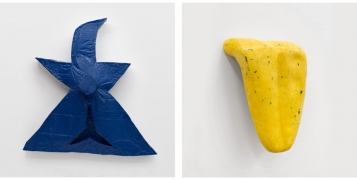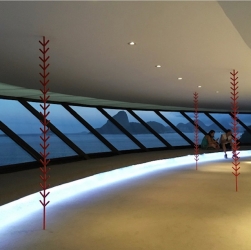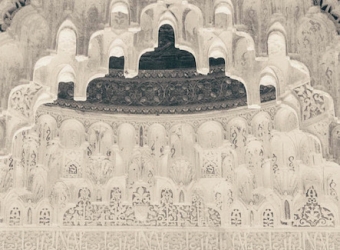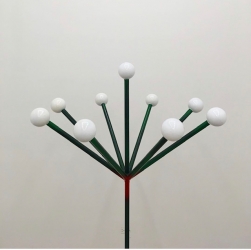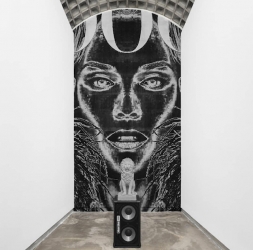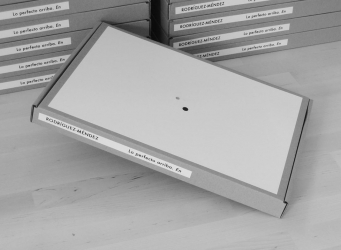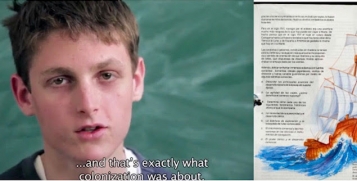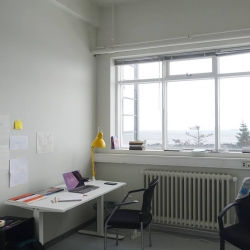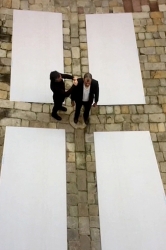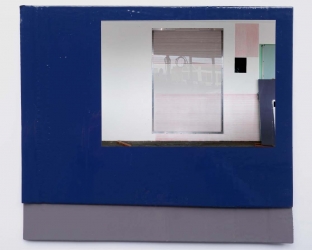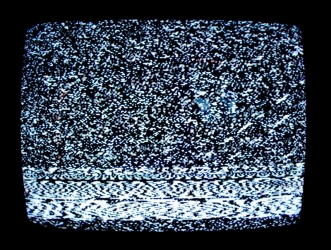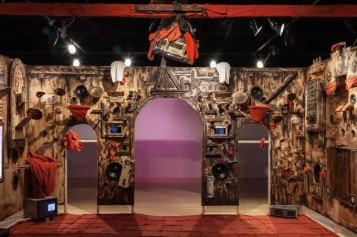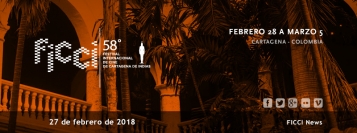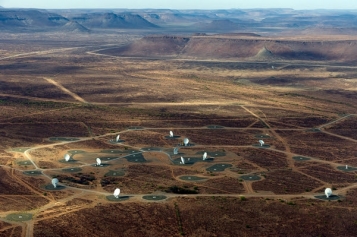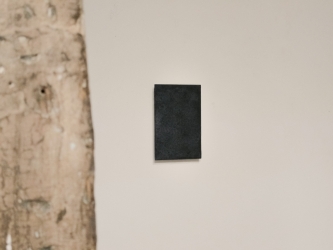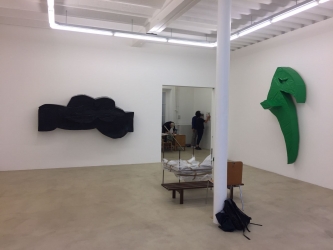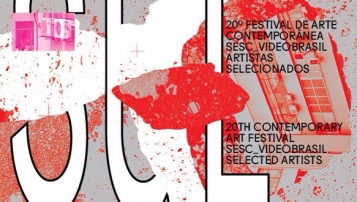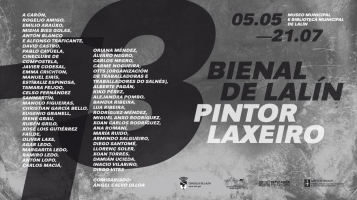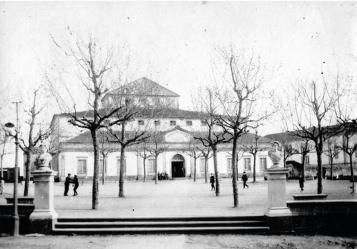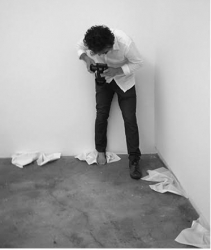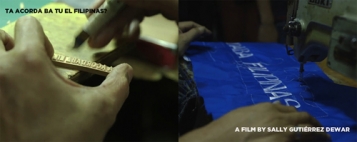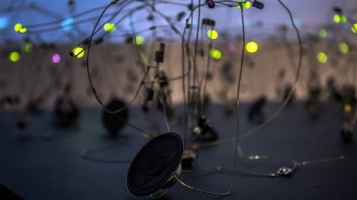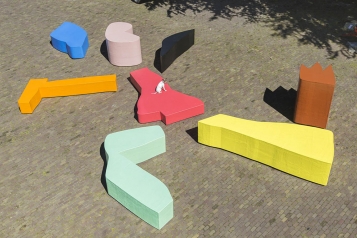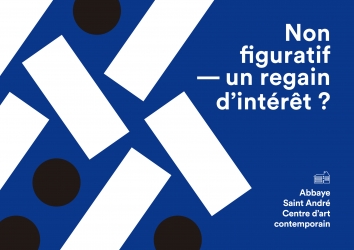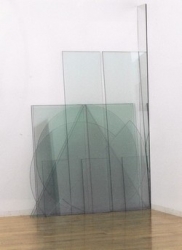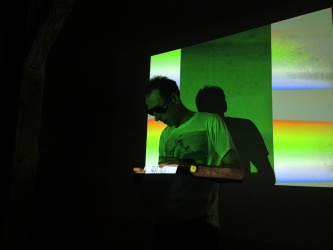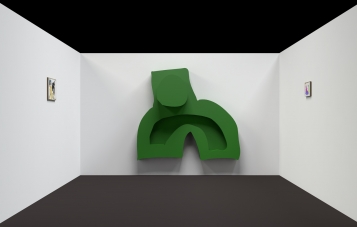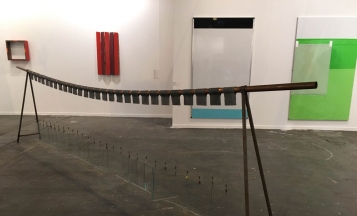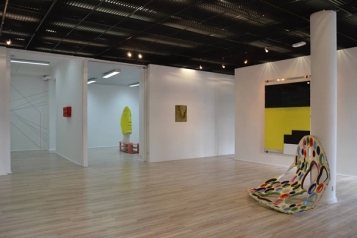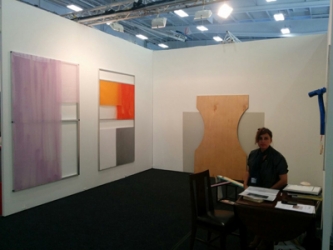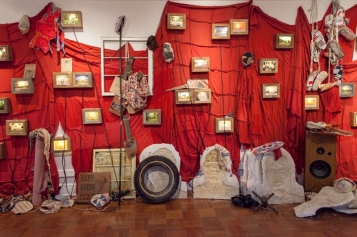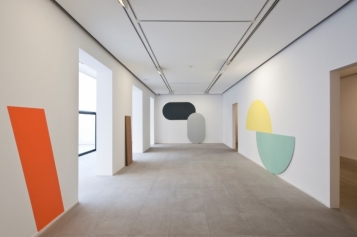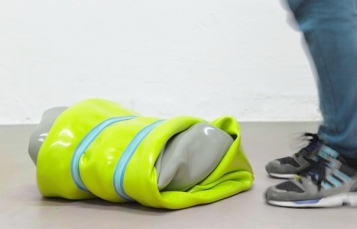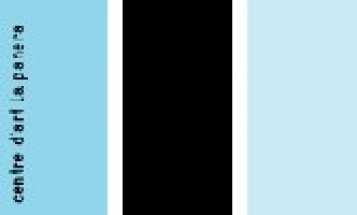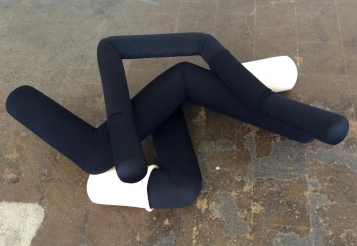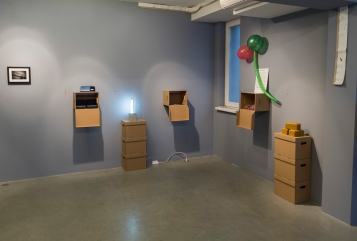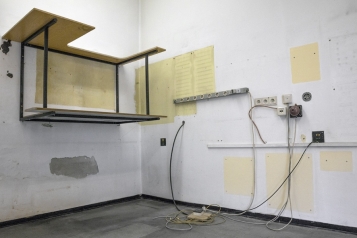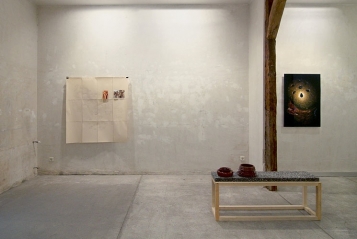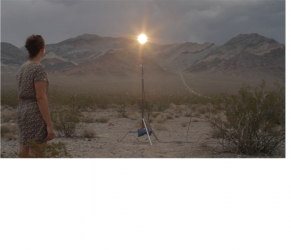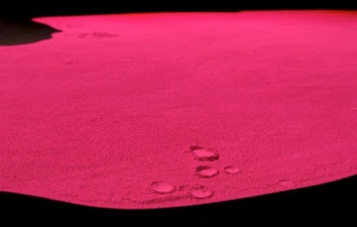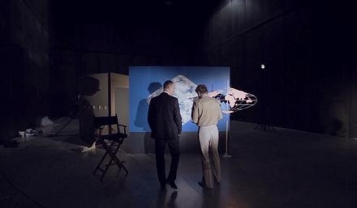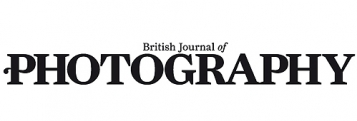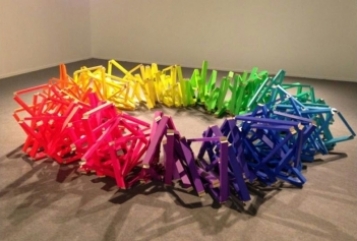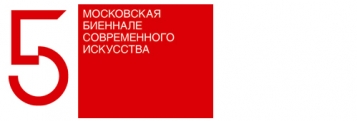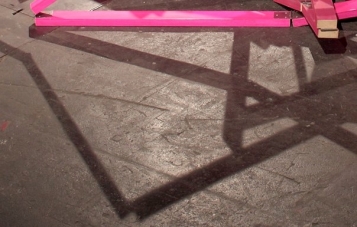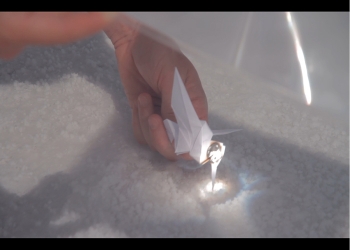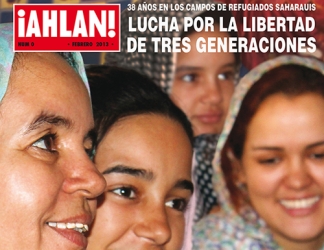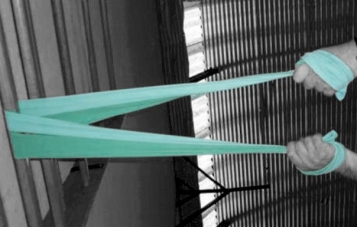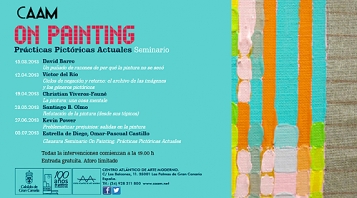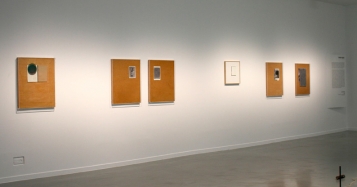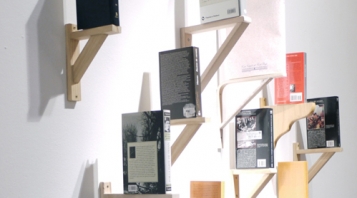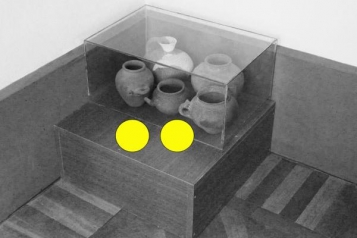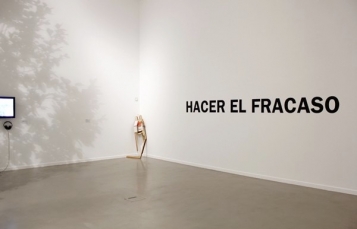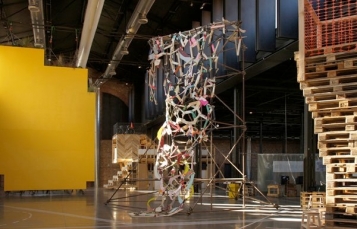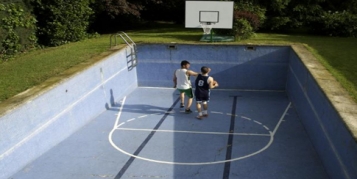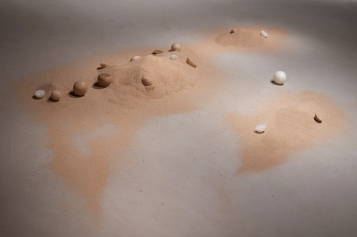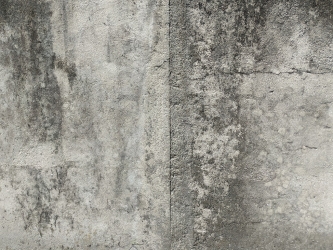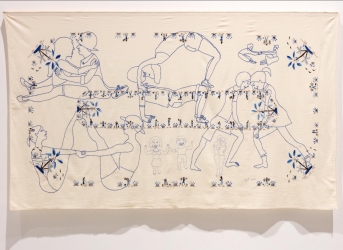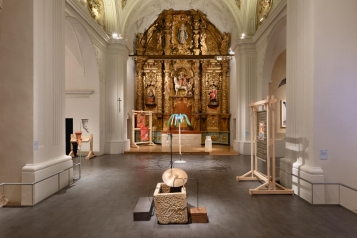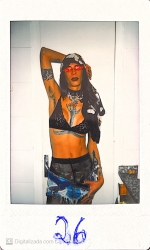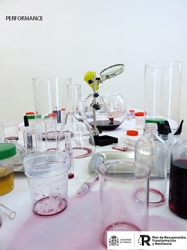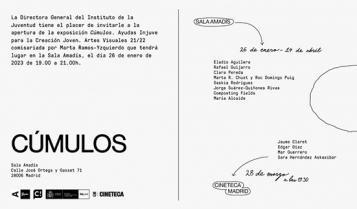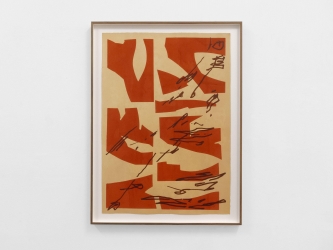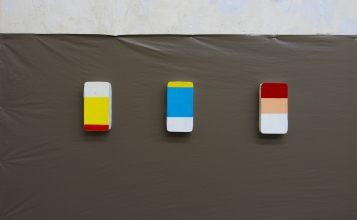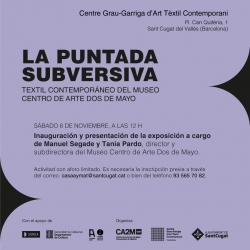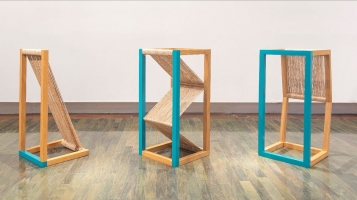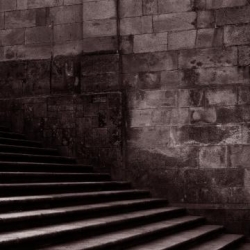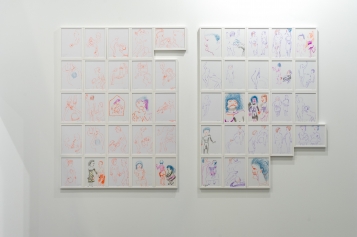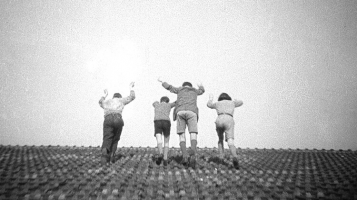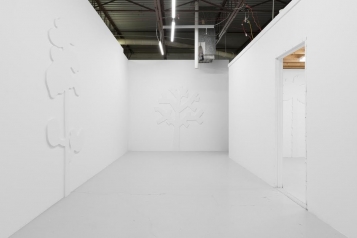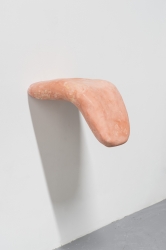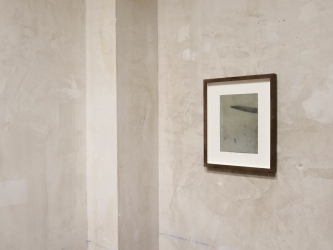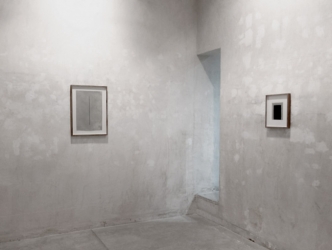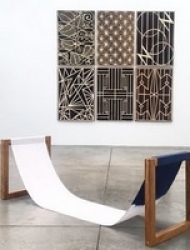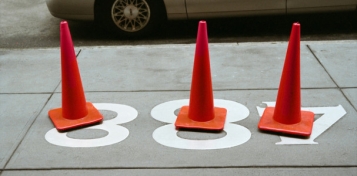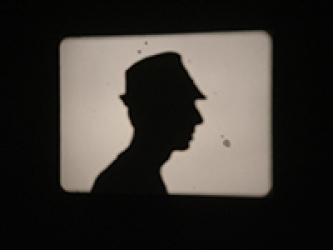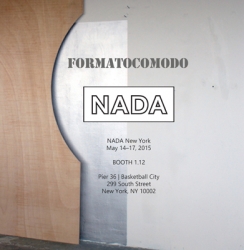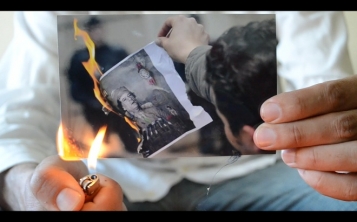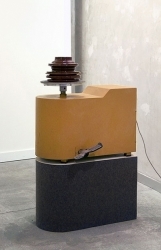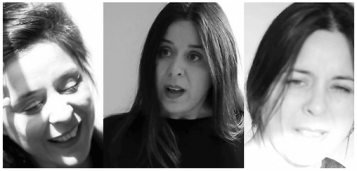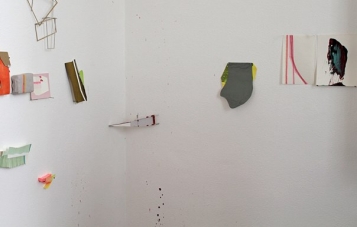El vértigo de las imágenes.
SEP 6 2025 - Mar Guerrero
JUN 27 2025 - Colectivo Ayllu
Ehibit "Fabular Paisatges" at the Museu Habitat, Bracelona
The Ayllu Collective is participating in the group exhibition "Fabular Paisatges" at the Museu Habitat in Barcelona, where nearly fifty artists and collectives are exhibiting, many of them with works produced especially for this exhibition.
"Fabular Paisatges" proposes reimagining the museum as a situated, processual, and collective space. An exhibition that articulates silenced memories, community resistance, and contested landscapes through a critical listening of the present [...].
For Manuel J. Borja-Villel, co-curator of the exhibition with Lluís Alexandre Casanovas Blanco and Beatriz Martínez Hijazo, the exhibition project does not respond to a prefiguration, but should be understood as an "essay." In this sense, it does not seek to represent a closed model, but rather is presented as a collective work in which, he points out, "the artists and researchers who have collaborated are essential to give life to a space where ideas are not subsumed within a general history, but are situated."
Fabular landscapes is structured around three fundamental pillars: the creation of a space for debate, friction, and antagonism; the production of a "humble exhibition," conceived as a relational rather than self-referential gesture; and the construction of a "situated museum," removed from the decontextualization processes typical of encyclopedic museums.
In this sense, "the verb 'to inhabit' implies a way of being and existing in the world, an exploration that invites us to inspect the construction of the environment, both physical and mental, as a result of historical processes and, therefore, unfinished and open to the possibility of difference," explains Borja-Villel.
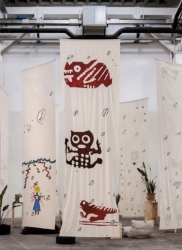
Exhibit "Blanco", Nacho Criado – PHotoESPAÑA, Círculo de Bellas Artes of Madrid
Círculo de Bellas Artes de Madrid
PHotoESPAÑA
04/06/2025 - 28/09/2025
Nacho Criado (Mengíbar, Jaén, 1943 - Madrid, 2010) is one of the most significant and influential artists on the Spanish contemporary scene, awarded the National Prize for Plastic Arts (2009). His work is in tune with the experimental practices produced in the adverse climate of the final years of the Franco dictatorship, the most significant manifestation of which was the Pamplona Meetings in 1972. Generally associated with conceptual art, his career traverses echoes of conceptualism, minimalism, land art, povera, and processual art. Nacho Criado's work thus escapes labels or classifications and is situated in the process that runs from the idea to its staging.
The exhibition "Blanco" articulates a conjunction of events that transcend the very concept of photography. It is the result of multiple works from the first half of the 1970s that revolve around language and action through photography, where the represented object becomes present in time and space.
The exhibition's title comes from the eponymous work "Blanco," originally presented in 1974 as part of the series "New Artistic Behaviors" coordinated by Professor Simón Marchán-Fiz at the German Institute in Madrid. The work reveals the essence of the photographic process through a continuous play of opposites. It establishes a double visual narrative between positive and negative, the underlying basis of which questions the expansion of language beyond the intrinsic meaning of the word.

FORMATOCOMODO presents Ventura Profana in ArPa São Paulo 2025
In this 4th edition of the ArPa São Paulo art fair, we are pleased to present the works of Brazilian artist Ventura Profana. This is an exceptional event, as Ventura has never participated in an art fair before. From May 28th to June 1st, we will be exhibiting three of her collages from the series "RAIZ SUADRADA DE SETE" (SQUARE ROOT OF SETE), accompanied by two installations and a video, at BOOTH U6 (SECTOR UNI).
Ventura Profana (Salvador, BA, 1993) is a multidisciplinary artist whose practice encompasses visual arts, performance, music, and literature. A Black transvestite pastor and missionary, her work critically investigates the implications of Deuteronomism and the expansion of neo-Pentecostal churches in Brazil and abroad, redefining Christian symbols from a dissident and decolonial perspective.
He recently participated in the Venice Biennale, in the Swiss Pavilion, alongside the artist Guerrero do Divino Amor. In 2023, he also participated in the 35th São Paulo Biennial, the Serpentine Gallery (United Kingdom), Vienna (Austria), the Centre d’Art Contemporain (Switzerland), and the Goethe-Institut (Germany). (São Paulo Museum of Art). His work is part of the collections of the Pinacoteca do Estado de São Paulo, the MASP (National Museum of Contemporary Art), and the Collegium.

¿Adónde irá el pájaro que no vuele? ¿Adónde iré yo que no te lleve? — Casa Encendida
May 16 - July 27
Curators: Ángel Calvo Ulloa and Julia Castelló
25th Anniversary of Generations Program
¿Adónde irá el pájaro que no vuele?, curated by Ángel Calvo Ulloa and Julia Castelló, brings together artists whose works are permeated by the idea of generosity. The exhibition is part of the 25th anniversary celebration of Generations, the Montemadrid Foundation's call for young artists, and presents the current work of artists who have been part of the award's history. In parallel, the exhibition expands under the title Where Will I Go That Will Not Take You? to three independent spaces for contemporary creation and reflection near La Casa Encendida: Conciencia Afro, La Parcería, and Araña.
The exhibition begins with a reflection on the term generation, which—like generate or generosity—shares its etymological origin in the Latin root gen-. Based on this idea, the curators propose a journey through artistic practices that emerge from generous action, that flourish in a collaborative manner, that involve responsible modes of production, or that seek to generate a social return.
The galleries of La Casa Encendida host pieces, activations, and installations by Javi Álvarez, Salvador Cidrás and Vicente Blanco, Santiago Cirugeda, Pedro G. Romero, Patricia Gómez and María Jesús González, Marta de Gonzalo and Publio Pérez Prieto, Laila Hotait and Nadia Hotait, Susanna Inglada, Juan del Junco, Carlos Maciá, and Alberto Peral.
In parallel, the exhibition expands under the title ¿Adónde iré yo que no te lleve? to three independent spaces for contemporary creation and reflection near La Casa Encendida. Some of the most recent artists selected for Generations participate there: Agnes Essonti Luque (Afro Consciousness), Sara Santana (Araña), and Raúl Silva (La Parcería).
The work Marta de Gonzalo and Publio Pérez Prieto present in this exhibition is titled Don't Stop Doing (2025. Chalk text on four recycled blackboards measuring 250 x 120 cm). It is a list compiled by the artists of imaginary reasons why people who practiced art stopped making art or gave up their professional careers, always based on the idea of a ward off or inoculation against discouragement and for strengthening themselves in the face of difficulties and potential crises. It is complemented by an educational proposal in which art students create their own phrases and write them on their blackboards.
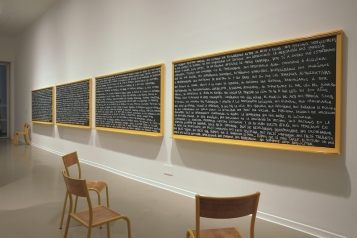
MAR 1 2025 - RODRÍGUEZ-MÉNDEZ
Mirror of the Mind: Figuración en la Colección Jorge M. Pérez
ENE 2 2025
MARY-JO PELAEZ — FUERA DE FORMATO
FORMATOCOMODO presents "Fuera de Formato".
From the 9th to the 12th of January, we invite you to submerge yourself in the unexpected and the multifaceted through "micropunto producciones", led by actor Jorge Calvo. During this event, a series of short videos will be exhibited, rescued from an audio-visual archive featuring the artist Mary-Jo Paláez, offering a critical look at a moment in art that many might consider forgotten.These videos capture the essence of an artist who seeks to reclaim her place in the art world, after having remained on the margins, as if they were a caricature of art itself. Accompany Mary-Jo on her journey to New York, where she becomes a symbol of the fight for visibility in a cultural panorama that often seems indifferent.We begin the new year with an invitation to laugh, question, and celebrate creativity in all its forms, remembering that art, in its essence, is a game that challenges conventions.We hope to see you at this inaugural event, where humour intertwines with criticism, and art becomes a medium of reflection on the passing of time and relevance in the changing cultural panorama. Because, in the end, what unites us is the capacity to laugh at ourselves and our ambitions, whilst we continue searching for our place in a world in constant movement. Welcome to "Fuera de Formato".
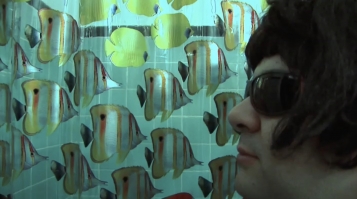
Karlos Martínez featured in ARTFORUM — Max Andrews
Comprising
just four works, Karlos Martínez Bordoy’s exhibition “Folded Forms” was
in part a droll reaction to the dimensions of FormatoComodo, among the
smallest of Madrid’s commercial galleries. The exhibition’s hardworking
conceit hinged on the so-called Murphy bed. This space-saving invention,
patented more than a century ago in the US and lately revived as a
tiny-home hack, lets a mattress and bed frame fold vertically against a
wall or into a cupboard, freeing up floor space. Bed Base #2 (all
works 2024) is a tall standing structure of metal bars affixed to the
wall, flanked on each side by columns of wooden bed slats that spill
onto the floor. Two octagonal coffin-like forms made from narrower bars
were bolted between the uprights, held open by steel tensing cables like
a pair of scissors. Delicately stitched textile panels, secured in
place as if on a loom by straps and metal springs, span these
intersecting frames. Bed Base #1 incorporates a central spine
of similar sanded wooden slats and three body-proportioned iron frames,
staggered like a sequential diagram demonstrating a whole range of such
fold-out berth contraptions. (Indeed, the series includes more works
than were included in this presentation.) Martínez’s exacting choice of
hardware and soft materials offered a correspondingly precise set of
allusions. For example, the coarse fabric bands that braced the textile
panels were of such a specific blue-gray tone and texture that they
immediately brought to mind the straps of some vintage navy-issue duffel
bag, while the gently curved birchwood bed slats suggested sober IKEA
furniture. The coded sculptural imaginary was somehow part midcentury
flophouse, part contemporary tourist-rental micro apartment—both
symptoms of an economic squeeze and versions of vaguely seedy urban
malaise. The motif of the Murphy bed already brought its own ready-made
cultural freight through how it has been played for a laugh in silent
film and early Popeye cartoons. Yet in Martínez’s hands, the
disappearing-bed concept offered itself as a playfully fickle take on
classical sculpture’s long-standing predilection for verticality and
figuration over salacious postwar horizontality and materiality. Poised
like mechanical switches between the upstanding pragmatism of making do
in close quarters and the sensuality one might enjoy lying down in the
same, the eroticism in these hybrid sculptures was latent but not overt. Torn Curtain #1 made
it more explicit. A muted combination of wool cloth, lightweight
suiting canvas, and hanging straps (the same blue-gray textiles as in
the companion works) was stitched to two stiff flanges and suspended by
clamps and springs from a wall-mounted telescopic arm. Resembling a
cantilevered hanger for a couture fetish apron or a prototype for a
customized sex sling, it also suggested a deviant form of painting where
a stretcher might be more like a frame for supporting a body. Blind alluded
to painting in a different way: through the sensuous possibilities of
its tailored juxtaposition of refined fabrics and rigid metal strips. It
hung flat against the wall like a ribbed rolling shutter partially
blocking an imagined window. The stitched textiles’ closely spaced
parallel lines evoked the subtle grids of Agnes Martin, but Blind represented
something even more discreet: an indistinct threshold of disclosure,
concealment, and gendered materiality. Belying its sleazy reputation,
the Murphy bed was originally designed to circumvent courting customs
that would not allow a lady to enter a gentleman’s bedroom. Martínez’s
“Folded Forms” opened out its metaphor into a meticulous consideration
of how we negotiate personal space and concealed desire.
La lluvia no viene del cielo — Collegium
Karlos Martínez Bordoy featured in Art Viewer
The skin of reality: The house of flesh and the
second skin of truth
In the heart of Bilbao,
the Okela Kultur Elkartea space stands as an apex where the perception of
existence becomes labyrinthine. “FRONTS” is a swarm of geometric canvases that
metamorphose architecture into a skin that beats, breathes, and pulsates with a
vitality that transcends its own mortality. In this context, architecture
transforms into a gigantic wall that constantly collapses and reconfigures
itself, as if the very skin of reality was trying to escape its finite
condition.
The exhibition evokes the
classic tale “The Fall of the House of Usher” by Edgar Allan Poe. Here, the
twisted and distorted tarpaulin reveals the fissures and cracks between
appearance and reality, between the visible and the invisible, where a wall
partition slowly crumbles, devoured by an invisible force, in which boundaries
are permeable and getting more and more blurred.
In this labyrinth of
memory, the visitor is taken on a pilgrimage through the space that was once a
butcher shop and now holds the remnants of time’s passage. The work is a wall
that becomes a metaphorical network of dry leaves that crackle and unfold like
a blanket, enveloping him/her in a sensory experience. Each piece of the
sculptural ensemble is a precarious balance between two opposite extremes. A
defence that turns into a growing carpet upwards and downwards, forming a
miniature space within the same space.
In this sense, the canvas
takes on natural forms: curls, extensions, and withered lines to lead us to the
boundary between the outer and the inner world. A wall that has turned into a
bottomless moat that aims to swallow the visitor, absorb him/her in its depth.
The exhibition invites to explore the border between the concrete and the
abstract, where the pieces are nothing but an extension of the human body
itself: our skin beyond ourselves.
Karlos Martinez Bordoy (Bilbao, 1982) lives and works between the Basque Country and Madrid. His
speciality is sculptural production with objects in different plastic and
visual media. Some of his exhibitions include: “Dark Matters” at La Taller
Gallery, Bilbao (2024); “Gaps & Corners” at Nadie Nunca Nada No, Madrid
(2023); “Black Patterns” at Carreras Múgica, Bilbao (2021), and “Egin Berri” at
the Guggenheim Museum, Bilbao (2017).
His work has been
incorporated into the Collection of the Reina Sofía Museum in Madrid, la
Colección Compartida (Shared Collection) of the Museum of Contemporary Art of
the Basque Country-Artium Museoa, the Museum of Fine Arts in Bilbao and
Tabakalera in Donostia-San Sebastián.
Martínez works sculpture
from drawing and from two dimensions, a process in which the volume comes to
life from the plane. Currently, his work focuses on exploring one’s desire,
capturing it, and questioning the possibility of doing so, with the suspicion
that actually, binding desires rather means submitting to them.
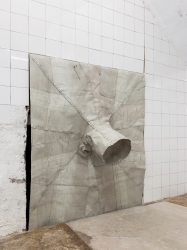
Marta de Gonzalo and Publio Pérez Prieto featured in FRIEZE
What to See During This
Year’s ARCOmadrid
From a sprawling
exhibition dedicated to the influence of Indigenous art of the Americas to
Stephanie Comilang’s first solo show in Spain
Artists and secondary-school teachers Marta de
Gonzalo and Publio Pérez Prieto have a long history of developing critical
curricula and running experimental, inclusive education projects with art
centres, notably as part of the Las Lindes working group, which launched in
2009 at the Museo Centro de Arte Dos de Mayo. This exhibition, however, is born
from the frustration that the duo’s aspirations for young people have largely
been hampered within the state-school system. A series of panels made from gouged
and painted desks depict scenes derived from several ‘disobedient’ classroom
performances realized with their students. The accompanying video Una
Mañana (One Morning, 2024) wryly pictures the artists’ hope for an
emancipated educational space as a school desk and chair set up in different
outdoor locations, such as a beach or a field. Shot in six 50-minute sequences,
its structure mirrors the timetable of a school day in Spain.
Marta
de Gonzalo and Publio Pérez Prieto, El Sueño (The Dream),
2023, engraving and acrylic inks on laminated board, 180 × 80 cm. Courtesy
the artists and Galería Formato Cómodo
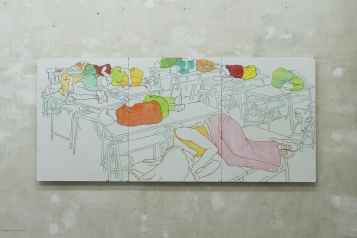
MAR 8 2024
FORMATOCOMODO IN ARCO MADRID 2024 — STAND 9A07
BERTA CÁCCAMO — DAMIÁN UCIEDA — ENGEL LEONARDO — FELIPE ARTURO — GUILLERMO LLEDÓ — MARTA DE GONZALO Y PUBLIO PÉREZ PRIETO — NACHO CRIADO — RODRÍGUEZ-MÉNDEZ — ROSARIO TRILLO — TANIA BLANCO — VICTORIA GIL
Also included in the program La orilla, la marea, la corriente: un Caribe oceánico, curated by Sara Herman y Carla Acevedo.
*
VICTORIA GIL
Victoria Gil is part of an essential group in the history of Spanish art, which emerged during the transition period and is composed of artists from Seville or based in Seville. Among these innovators and radicals are Fede Guzmán, Pedro G. Romero, Chema Cobo, Agredano, and Loncho Gil. In Renaissance Europe, owning tapestries was a sign of social, economic, and cultural distinction that only royalty, nobility, and the clergy could afford. Tapestries were commissioned from workshops in Flanders or Antwerp, had high prices, and usually depicted bucolic, hunting, rural, and popular themes. Victoria Gil uses humor and metaphor again, and both the bucolic scene of flower picking and the image of peasants giving thanks for their food and harvest are interrupted by the appearance of black birds that harass and assault the protagonists of both scenes.
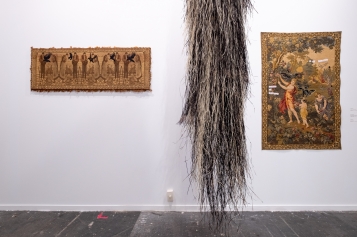
Progreso contra progreso — Miquel Mont expone en el Centro José Guerrero
«[...] Otras dos series se acercan a la abstracción desde posiciones distintas: la primera, titulada Cooperaciones,
pone en relación gestos, acciones y materiales asociados con nuestra
experiencia y la estética del bricolaje. Lo "bien" y lo "mal" hecho
cuestionan veladamente nuestras categorías del gusto y de la
subjetividad, auténticos valores democráticamente compartidos. Lo que
coopera son las distintas partes y elementos: los que componen el
cuadro, los materiales que lo constituyen, la lógica interna del
ensamblaje, los distintos gestos pictóricos que se inscriben en el
conjunto. Pero existe también cooperación entre el contexto en el que se
encuentran dichos elementos y la mirada del espectador, en un proceso
complejo que no termina nunca porque está en continuo cambio, lo que
implica un movimiento tanto físico como mental. Las piezas están
expuestas con un dispositivo mural de cartones pintados con esmalte
brillante. Los cartones crean secuencias y ritmos en el espacio
interaccionando con las composiciones, gestos y materiales que componen
las Cooperaciones».
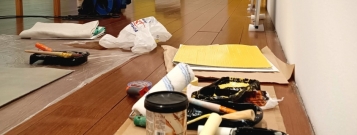
OCT 21 2023
Tenemos el placer de invitaros a
explorar el proyecto de Felipe Arturo, junto con los artistas invitados
Pedro G. Romero e Iván Candeo. Esta será una oportunidad para entablar
un diálogo en torno al proyecto de la galería. Además, se presentará una performance a cargo de Julio Jara, titulada "Ya no se canta en las obras".
JULIO JARA
Ya no se canta en las obras, 2023
Performance.
COSER EL RÍO — VICTORIA GIL EN EL C3A
COSER EL RIO — C3A - Centro de creación contemporánea de Andalucía, Córdoba
Comisaria: Esther Regueira
Coser el río es un relato visual y afectivo generado con el trabajo de Victoria Gil
(Badajoz, 1964), una de las primeras artistas españolas cuya práctica
ha estado posicionada en las corrientes feministas desde sus inicios a
finales de los años ochenta.Obras creadas específicamente para esta
exposición se muestran junto a otras anteriores que contextualizan su
trabajo y ayudan a generar un espacio que elude formas de control e
invita a dejar fluir los pensamientos y los deseos. En esta muestra
conviven cuadros, dibujos, documentación de performances o prácticas
textiles, en los que la artista propone una clara desjerarquización de
los géneros, formatos y técnicas establecidos a lo largo de la historia.
Se trata de propuestas que versan sobre de los abusos de poder, la
construcción política de los cuerpos, los tabúes impuestos por la
religión, la reificación de las mujeres en la sociedad patriarcal, las
consecuencias de los procesos decoloniales y los efectos del capitalismo
en nuestras identidades, deseos, cuerpos y subjetividades, temas a los
que podemos añadir el amor y las relaciones que se derivan de las
interpretaciones siempre subjetivas de este sentimiento. Son trabajos en
los que podemos apreciar herramientas fundamentales de la práctica de
Gil: la transgresión y un particular sentido del humor. La obra de
Victoria Gil cuestiona la banalidad de la categorización binaria
establecida por la historia heteropatriarcal oficial que divide a las
mujeres en buenas y malas,porque esta artista es una Houdina que escapa a
las ataduras impuestas a las mujeres socialmente y libera a muchas
otras. A brujas y hechiceras como Circe (Circe hace un brebaje) para
quienes reivindica la condición emancipadora de sus saberes; a mujeres
como Teresa de Ávila y María Alcaforado (en las series ¿Qué mandáis
hacer de mi?), capaces de ejercer sus libertades a pesar de formar parte
de una de las instituciones más conservadoras de la historia de la
humanidad; o las piratas como Mary Read y Anne Bonny a quienes
inmortaliza en un cuadro que reconoce la fortaleza de la amistad y que
sugiere un desafío a las identidades impuestas pues sugiere una
dimensión queer.La artista no solo homenajea a mujeres conocidas que han
pasado a la historia con nombre propio, sino también a aquellas
ciudadanas anónimas cuyas vidas y labores son tan fundamentales como las
de las otras: trabajadoras del campo (Estábamos tan tranquilitas),
cuidadoras (La buena vecina) o colonizadas (Los locales trabajan). En
estas piezas recupera la memoria doméstica de las mujeres que los
relatos oficiales han obviado. Para ello, recurre a las artes textiles
como lenguaje artístico entendiendo que la costura, el bordado y el
tejido no son un pasatiempo de las mujeres relegado al ámbito de lo
doméstico, sino una acción política feminista con el potencial de
activar debates sociales.Victoria Gil afirma trabajar desde la
intuición, pero la suya es, sin duda, una “intuición” formada e
informada, alimentada por lecturas, películas, exposiciones,
conversaciones y experiencias, así como por reflexiones, que comparte
con nosotras, para que juntas podamos coser muchos más ríos.
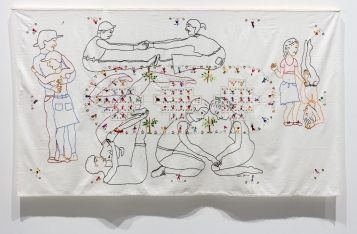
Roma, siempre Roma: infinitas formas — Mujeres de la Academia de España en Roma en las artes visuales.
La exposición,
organizada en el marco de la conmemoración del 150 aniversario de la
Academia, muestra de la actividad que algunas de esas artistas;han
realizado durante su residencia. Aun no estando todas presentes, para
ofrecer una mirada lo más amplia posible de su trabajo y de sus
diferentes lenguajes expresivos y técnicos, la exposición se ha
organizado en dos fases. Reúne una serie de pinturas, esculturas,
dibujos, grabados, fotografías y vídeo que sirven de ejemplo de las
numerosas obras estrechamente ligadas al directo influjo ejercido por la
ciudad. Se pretende mostrar el universo de matices e inspiraciones
igualmente resultado de la experiencia romana y de la vida en comunidad
de los creadores e investigadores que comparten su vida durante los
meses de su residencia en la Academia.
Las artistas participantes son:
Irma Álvarez-Laviada, Greta Alfaro, Paula Anta, Isabel Banal, Rosalía
Banet, Natividad Bermejo, Gabriela Bettini, Ángela Bonadíes, Berta
Cáccamo, Naia del Castillo, Pilar Cossío, Miren Doiz, Laura F. Gibellini,
Diana García Roy, Carmen Garrido, Yeyei Gómez, Begoña Goyenetxea, Inma
Herrera, Susanna Inglada, Pilar Insertis, Jana Leo, Isabel Martínez
Marín, Leire Mayendía, Rosell Meseguer (+Adler Guerrier), Clara Montoya,
Ruth Morán, Blanca Muñoz, Sonia Navarro, Esther Pizarro, Shirin Salehi,
Antonia Santolaya, Elo Vega, Begoña Zubero, Maria Teresa Peña Echeveste
y Belén Rodríguez.
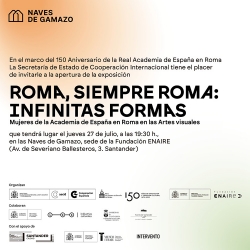
Poética de la memoria — Palacio de los Condes de Gabia, Granada
Marta de Gonzalo y Publio Pérez Prieto participan el la exposición Poética de la memoria,
organizada por el Palacio de los Condes de Gabia en Granada, hasta el 7
de mayo. La muestra está comisariada por Ramón Barbancho y en ella
participan los siguientes artistas:
Roberto Aguirrezabala, Fernando Baena, Jorge Barbi, Ana Condado, Marcelo Expósito, Marta de Gonzalo y Publio Pérez Prieto, Nuria Güell, Rogelio López Cuenca, Gregorio Méndez, Ana Navarrete, Lola Pérez, Espe Pons.
En el trabajo que nuestros artistas presentan, Más muertas vivas que nunca (2002),
una joven mujer muerta nos habla al oído. Tras participar en las
colectivizaciones de tierras en Extremadura y Andalucía, fue una de las
4.000 personas fusiladas en la Plaza de Toros de Badajoz a partir del 14
de agosto de 1936, día de la toma de la ciudad por las tropas
franquistas durante la Guerra Civil. Ella habla desde la muerte, en
espera de lo que los vivos pueden hacer de sus sociedades.
FEB 3 2023 - Mar Guerrero
Generación 2023 — Mar Guerrero
The Generación 2023 exhibition features different sculptural and audiovisual projects conceived from a spatial logic and organised around terms that question themes related to current issues. The installations and expanded objects are open to completion by spectators as they move through the space.This year the jury was composed of Aimar Arriola, a freelance curator and associate researcher (2020-2023) at Azkuna Zentroa, Bilbao; Yaiza Hernández, lecturer in visual cultures at Goldsmiths, University of London; and Catalina Lozano, chief curator at the Basque contemporary art museum, ARTIUM Museoa.
Un viaje eterno by Mar Guerrero starts from an investigation into the evolution of the dog and the artificial manipulation of canine breeds by humans, which is related to genetic manipulation in biotechnology. The main objective is to investigate ecology and temporality from the reference of animal genetic manipulation and the obsolescence of materials and resources, emphasizing the concepts of recycling and reuse through the use of organic and/or discarded materials, such as silencers from motorcycle, blown glass and canine hair.
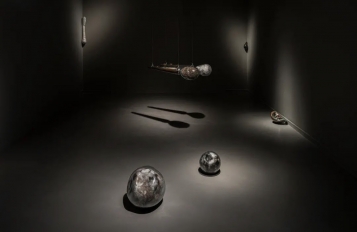
ENE 26 2023 - Mar Guerrero
Cúmulos — Mar Guerrero
Presentación del libro "Berta Cáccamo. Horas Felices"
Evento a cargo de Juan de Nieves en la Galería Formatocomodo
Publicado por: Patio Herreriano, Museo de Arte Contemporáneo Español.
Textos: Juan de Nieves y Patricia Dauder.
Diseño: Tipos móviles.
Coordinación editorial: Juan de Nieves.

Dégustation UNLID
Dégustation
UNLID / Single channel video / HDV, colour, sound, 16:9 /
18min. 18sec
UNLIDis a project which focuses on world food policies and the food industry. It consists of a series of sculpture-paintings thought to shape an installation that reflects and questions the origin and impact of processed foods that are daily purchased in supermarket chains and department stores. UNLID is developed from the recreation, appropriation and reinterpretation of the packaging of processed food from the corporate monopoly. The alteration of the original graphic layout of the packaging is intended to shed light on the power system, international policies and agricultural models.
https://www.condeduquemadrid.es/actividades/pan-y-circo
Forecast Form: Art in the Caribbean Diaspora, 1990s–TodayNov 19, 2022 - Apr 23, 2023
The 1990s were a period of profound social, political, and economic transformation. From the dissolution of the Eastern Bloc to the rise of transnational trade agreements, the decade’s large-scale shifts ushered in an era of international connectivity and social upheaval. In the cultural sector, art exhibitions expanded and turned global, and dialogues around identity, especially by those who have suffered systemic oppression, were featured front and center in cultural debates. The forces of this pivotal decade also had a major effect on the production, circulation, and presentation of art from the Caribbean.
- Adán Vallecillo Alia Farid Álvaro Barrios Ana Mendieta Candida Alvarez Christopher Cozier Cosmo Whyte David Medalla Deborah Jack Denzil Forrester
- Donald Rodney Donna Conlon and Jonathan Harker Ebony G. Patterson
- Engel Leonardo .y mas
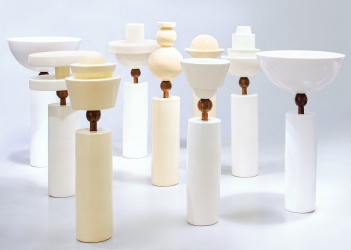
CAMINOS III
CAMINOS III
11 November 2022 - 21 May 2023
Centro Galego de Arte Contemporánea
First floor
Curated by Alberto Carton and Santiago Olmo
Artists participating in the exhibition:
Vito Acconci, Janine Antoni, Miguel Ángel Blanco, Mar Caldas, Benvenuto Chavajay, Mona Hatoum, Kubra Khademi, Manolo Laguillo, Juan Lesta, Priscilla Monge, Jürgen Partenheimer, Damián Ucieda, Oriol Vilanova
Hay un río de oro negro bajo A Coruña
EL PAIS.BABELIA Hay un río de oro negro bajo A Coruña
Gloria Crespo Maclennan
‘Camiño
negro’ es una serie fotográfica que recorre el itinerario trazado por
un oleoducto soterrado a lo largo de seis kilómetros en la ciudad
gallega, que pone de relevancia las contradicciones entre la idea de
progreso y otras alternativas de subsistenciaExiste una ruta soterrada
en A Coruña que no es fácil de detectar. Se extiende a los largo de seis
kilómetros, entre arrabales, carreteras y zonas verdes. Un camino de
ida y vuelta, por donde circulan toneladas de petróleo. Parte del puerto
hasta alcanzar la refinería del valle de Bens, pero su recorrido es
solo visible en su primer tramo, cuando cruza la carretera desde el
puerto y a su paso por el barrio de los Castros. El resto queda oculto a
los ojos de los transeúntes. Solo unas balizas bicolor, las cámaras de
seguridad o distintos carteles advierten indirectamente de su
existencia. Un camino de oro negro que revela la transformación de un
territorio y pone en evidencia las contradicciones entra la idea de
progreso y la pervivencia de otras formas de vida y subsistencia. La
tensión entre la población y una industria pesada que Damián Ucieda (A
Coruña, 1980) ha sabido captar con su cámara para dar forma a un libro y
a una exposición que comparten título, Camiño Negro
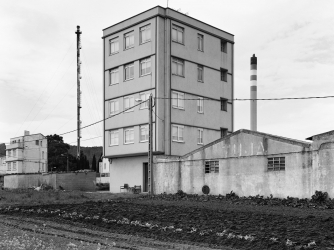
Description of the day
CRITICS`PICKS ARTFORUM
A
A
Berta Cáccamo, Descrición do día (Description of the day), 1988–90, mixed medium on canvas and board, each piece 27 1/2 x 21 1/2ARTFORUM
After living in Barcelona, Paris, and Rome, Berta Cáccamo returned in the mid-1990s to her native Galicia, where she made “Horas felices” (Happy Hours), a series of one-line abstractions in which a thick, sinuous brushstroke expands across each canvas, folding in on itself like an intestine. The series lends its title to this exhibition, which brings together paintings by the artist dated from the late 1980s to 2018 alongside notebooks, sketches, annotations, and a collection of knickknacks and discarded objects.
These years map a trajectory, from the discreet informalism of her early output, to the embrace of a more autonomous stroke—slow and meandering—to colorful abstractions, to a more process-oriented approach open to various mediums and techniques. In untitled works from 1990, the paper absorbs the ink, creating organic marbling patterns. Other times, as in Blue, 1996, the brush is dragged so that, with the winding or straightness of the gesture, paint accumulates on the edges of the stroke or is dispersed by the movement of the bristles. From her own statements, we know that Cáccamo conceived of painting as a method of introspection where literature and philosophy also played a part. Here, we are deprived of her words, left to somehow content ourselves with a body of work cut tragically short with the artist’s death in 2018, at age fifty-eight. Seeing how the same motifs and colors emerge repeatedly in her work, we can fantasize that painting, even in the absence of its author, continues to converse with her.
Translated from Spanish by Michele Faguet.
https://www.artforum.com/picks/berta-caccamo-88399
— Joaquín Jesús Sánchez
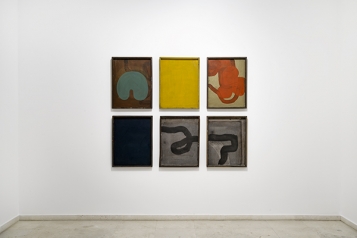
MAR 12 2022 - Loup Sarion
saliva
Text by Emma McCormick-Goodhart x Bureau Eponym
Saliva
“Brassaï:
In the lower strata of the valley of Les Eyzies, excavation
archaeologists had the brilliant idea of preserving a cross-section four
to five meters high, with layers built up over millennia. It’s like a
mille-feuille.
Picass And you know what’s responsible? It’s
dust! The earth doesn’t have a housekeeper to do the dusting. And the
dust that falls on it every day remains there. Everything that’s come
down to us from the past has been conserved by dust.”—Pablo Picasso to
Brassaï
“It's just dirt, really.”—Peter Schlesinger
. . .
Brassaï’s
“mille-feuille,” Picasso’s phantom duster: such stratification is a
leitmotif in Loup Sarion’s two new parallel bodies of work in Saliva, of architectonic resin panel reliefs, and nose forms sculptured in beeswax.
Sarion’s
panels’ sedimentations—his “mille-feuille”—are not so much of
timescale, though, but of site and species of skin. Composites and
complex infoldings, in part, of fissure and cupule-filled walls of his
studio, and floors of his apartment, his panel casts, via the molds that
mothered them, migrate lived architectures in Bushwick, Brooklyn, to
neutraler ones in Cologne. As if skin tissue being grafted, they clothe
gallery walls in sudden synthetic material fictions of an epidermal kind
of urban Palaeolithic, which, in feeling, share something of the
inevitability and drama of a fossil’s sedimentary re-emergence as
readymade relief. What was first floor is now wall—not that such axes
hold, as in caves, which are simply volumes wrought by water.
Spatialities of uninterrupted geological fabric.
Here, casts
molt city surfaces, turning hide in their unpeeling, and into which real
dust—like white noise—paints itself, by itself, in particle heap. An
aesthetics of the nan specs of black floor paint, rust flecks from a
belt. Even sheen endures its translation from negative to positive. One
thinks of Heidi Bucher’s “skinnings,” of interior architectures coated
in latex and then stripped, rendered entire, except Sarion makes
stranger, chimeric figurations; ones that move further from their
sources. His are haptic, but unfaithful facsimiles—and in their playful
imaging of fabric and occasional frottage-applied pigment, whether
charcoal or metal dust, more like Pati Hill’s xeroxes than indexical
molds.
Leather belts, mostly sidewalk foraged, their skin still
legible as such; walking canes, always sensory prostheses and spatial
stethoscopes that “see” for us. A shirt, uncannily soft even in newfound
solid form, though note its loose soil hem. These layerings have their
origin in his and any’s lovers’ clothes’ own entwinings—the hasty
undress in the kitchen, the strewing—inadvertent mapmaking reencountered
as chance logic mornings after. As casts of molds that themselves
“kissed” walls, Sarion’s panels are love letters of a mille-feuille
kind. Of an eros of the imprint.
Nose extrusions, in
counterpoint, perform a prosthetic kiss of remote sensing—as aerial,
olfactive “tongues,” and mouths for molecules, whose machinations remain
occluded from view. They insist, sotto voce, that unmoldable
anatomical cavities are the lived architectures that give us to sense,
to wish to touch, to want to mold, in the first place. Urges that exceed
origin.
New York City, March 2022 |
|
Loup Sarion: Born 1987 in France, lives and works in New York.
Selected solo and 2-person exhibitions:
AD, New York, USA / Berthold Pott, Cologne, Germany /
C L E A R I N G, New York, USA / Jeanroch Dard, Brussels, Belgium / Formatocomodo, Madrid, Spain / Kunstverein Heppenheim, Germany / M+B, Los Angeles, USA / Sorry We Are Closed, Brussels, Belgium / Spazio A, Pistoia, Italy
Selected group exhibitions:
Carl Kostyal, Sweden, MAC Val Museum, France / Socrates sculpture park, New York, USA /
Upcoming: International Objects, New York, USA (April 2022) / Le 109, Biennale de Nice, France (June 2022) |
|

VASOS COMUNICANTES . MUSEO MNCARS
A Drunken Boat: Eclecticism, Institutionalism and Disobedience in the ‘80s
Nouvel Building, Floor 0
In the 1980s, different exhibitions sculpted the sensibilities of the time. For the 1982 Documenta in Kassel, the curator Rudi Fuchs contemplated the possibility of titling the exhibition The Drunken Boat, after Arthur Rimbaud’s poem, in reference to an art drifting aimlessly, wandering outside of “style wars”. This absence of hegemonies would end up translating into an eclecticism of forms that defined artistic practices in that decade. Part of historiography interpreted it as a shift towards conservative values, where the absence of history and critique, as well as the recovery of artistic individualism, corresponded to a social and political reality dominated by the Reagan-Thatcher era.
The fledgling democracy in Spain would drive an institutionalisation of art that replaced social struggles against Francoism, and within this context the creation of the ARCO Art Fair and the Centro de Arte Reina Sofía came with an intense policy of national and international exhibitions, and a return to painting as the lingua franca. Opposite this apparent conservatism, a series of practices of disobedience rose to the surface, expressing their discontent with institutions and facing crises such as the AIDS pandemic. An art that embraced post-punk attitudes, new versions of feminism and the subversion of bodies.
https://www.museoreinasofia.es/coleccion/episodio-6
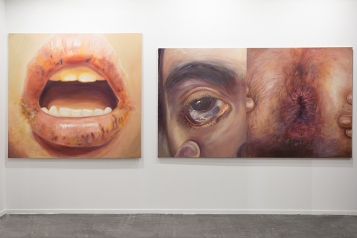
PANORAMA
En esta segunda edición de PANORAMA MADRID las exposiciones y galerías seleccionadas han sido:
Belén Uriel, Rayo Verde. The RYDER Projects
Fernando Sánchez Castillo, Ex Positio. Albarrán Bourdais
Gonçalo Sena, Circular Spaces. Galería Heinrich Ehrhardt
Juan López, Surco. Galería Juan Silió
Julian Rosefeldt, Penumbra. Galería Helga de Alvear
Los Torreznos, Las Palabras y las Cosas. Galería Freijo
Martin Llavaneras, Delta. Intersticio
Mercedes Azpilicueta, Katalina, Antonio, Alonso. NoguerasBlanchard
Miquel Mont, Deseos Borrados Recoloreados. Galería FORMATOCOMODO
Oriol Vilanova, Con los ojos abiertos en la oscuridad. Galería Elba Benítez
The publication Camiño Negro
The publication
Camiño Negro. Damián Ucieda is already on sale in bookstores, digital platforms and on the website of the publishing house Turner Libros.
FEB 3 2022 - Christian Garcia Bello
HORAS FELICES
HORAS FELICES de Berta Cáccamo Patio Herreriano.
Museo
de arte contemporáneo Español . Valladolid
29 -1 / 29-5/2022
“Horas Felices” es una exposición
de carácter retrospectivo en torno a la obra de la artista gallega Berta
Cáccamo (Vigo, 1963-2018), una de las pintoras más relevantes de su generación.
En ella, su comisario, Juan de Nieves, propone un juego de asociaciones
poéticas entre obras de diferentes momentos, desde finales de los años ochenta
hasta su muerte en 2018. El título de la exposición hace referencia a una serie
de pinturas realizada a mediados de los noventa, un sencillo enunciado mediante
el que la artista apela a un momento vital muy preciso de reafirmación de
la pintura como práctica liberadora. Berta Cáccamo se formó en Barcelona, donde
entró en contacto con la tradición catalana, y marchó en 1989 a París,
donde comenzó a forjar un estilo propio basado en una intensa y rigurosa
reflexión sobre el hecho de pintar. De esta incesante investigación da fe el
buen número de dibujos y de cuadernos que le acompañaron toda su vida y que
pueden verse en esta exposición. A su regreso a Galicia, Cáccamo trabajó exhaustivamente
en una pintura en la que vertía, a un mismo tiempo, ricas referencias a la
historia del arte y un poderoso caudal emocional. La programación de
"Berta Cáccamo. Horas felices” responde a nuestra voluntad de revisar
y presentar la obra de mujeres pintoras activas en nuestro país y
pertenecientes a generaciones diversas, como Soledad Sevilla o Mercedes
Mangrané.
https://museoph.org/
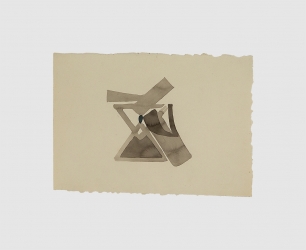
SEP 14 2021 - Christian Garcia Bello
MAY 4 2021 - Mar Guerrero
Presentación del proyecto y LIbro ( 3 de Mayo al 8 de Mayo )
La luna de cristal, 2020
Realizado en Talleres de Obra Gráfica de la Fundación Pilar y Joan Miró, Mallorca (ES)
Diez estampaciones mediante serigrafía sobre papel Oikos 300g en diferentes formatos. Serie limitada de veinte copias, 36 x 52 cm.
Hallazgos recientes sugieren que la capa de hielo que cubre la luna Europa contiene cloruro de sodio (NaCI), el principal componente de la sal que encontramos en la Tierra. Esta referencia sirve de punto de partida para desarrollar una serie de imágenes que simulan fotografías tomadas de la superfície de esta luna de
Júpiter, siendo imágenes procedentes de la costa mallorquina. Esta
dualidad espacial nos sitúa en un territorio invadido por la ambiguedad y
la incertidumbre. Las esferas que componen las imágenes emergen en un
mapa de movimientos distantes y encuentros estelares.
ABR 29 2021 - Mar Guerrero
PILAR JUNCOSA & SOTHEBY’S AWARDS AND GRANTS 2020. London
PILAR JUNCOSA & SOTHEBY’S AWARDS AND GRANTS 2020. London
Enrenfeld
Exposición colectiva : „Ehrenfeld“
24 de abril - 29 de mayo de 2021
Daniel Boccato,
Jonathan Binet, Samuel Francois, Max Frintrop, Manor Grunewald, Agata
Ingarden, Jens Kothe, Colin Penno, Johanna von Monkiewitsch, Evan
Robarts, Loup Sarion
http://bertholdpott.com/
OCT 20 2020 - RODRÍGUEZ-MÉNDEZ
Del hijo, la respiración’, de RODRÍGUEZ-MÉNDEZ (Proxecto de intervención en Capela do Carmen)
Dos superficies de tela de 9x6m. sobre sendos bastidores son colocadas en los laterales de la Capilla del Carmen en Lugo. Estos lienzos contienen en su parte superior todo el aceite que ha sido entregado por los miembros de la cofradía del Carmen y depositado en una vasija dispuesta en el interior de la iglesia.En Del hijo, la respiraciónel aceite se va desvelando verticalmente por la superficie de la tela, como una presencia que se descubre lentamente y que habla de un peso, una forma corporal sutil extendida construyendo a su vez un paradójico y vívido plano.Me resulta especialmente emotivo que ese material (el aceite) provenga de los espacios íntimos y privados de las familias de los cofrades para unirse en un solo “cuerpo” en la vasija, que posteriormente, en un proceso lento y sin intervención de ningún tipo irá ocupando las dos superficies de tela en una transfor- mación que parecería no acabar nunca, como lento y sin término es el proceso del conocimiento.Contiene en el título de esta obra la atención a dos materiales que simbólicamente se encuentran indivisibles, el oxigeno y el aceite, la condición física limi- tante de un cuerpo en el misterio de ser vivo desde la pertenencia a un origen, un padre y por lo tanto a alguien más y mayor que sí mismo y la de la expan- sión rítmica de la inhalación del oxigeno que como “membrana inmaterial” lo ocupa todo y lo vivifica.
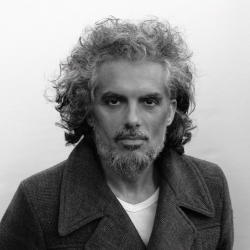
OCT 1 2020 - RODRÍGUEZ-MÉNDEZ
ENSAYO ANTES DE LA ACTUACIÓN” EVOLUCIONA. LA HEREDAD
Inauguración 1 de octubre a las 20 horas. Caja Blanca de Las Cigarreras
Exposición dentro de la Convocatoria Buitblanc de la Concejalía de Cultura, Centro Cultural Las Cigarreras.
Rosana Antolí / Gonzalo Puch / Zilvinas Landzbergas / Julia Mariscal / Rodríguez-Méndez / Eduardo Infante. Comisaria, Diana Guijarro
La exposición Ensayo antes de la actuación es un proyecto de investigación curatorial que busca generar un territorio en proceso de crecimiento. Una especie de fase preparatoria donde las diferentes propuestas se encaminan a reflexionar sobre la presencia corporal, sobre las posibles interacciones entre los cuerpos y el espacio, y en cómo las partes pueden convertirse en un todo complementario.La propuesta pretende profundizar en las múltiples posibilidades que nos brinda el ensayo y el error entendidos como experimento abierto a la incertidumbre, una prueba
para conocer si algo funciona o no y en base a esto, ajustarnos y enlazarnos en una supuesta sincronización dentro de un entorno que se encuentra marcado por diferentes pautas.De esta forma la exposición se entiende como un espacio dinámico, un lugar que los artistas harán crecer exponencialmente a través de una serie de actividades que
buscarán la participación activa de los diferentes públicos.
PROYECTO DE RODRÍGUEZ-MÉNDEZ -LA HEREDAD
La heredad.
Papel 50x70cm. Grafito y tintura dorada.
La Habana, Cuba 2018 (en proceso).
Simultáneamente un grupo de niños y niñas menores de 6 años dibuja sobre papel una escalera, tomando
como modelo una escalera de mano real situada en el mismo espacio donde sucede la acción.
Una vez finalizados todos los dibujos el artista interviene sobre las horizontales de esos dibujos con líquido
dorado.
Esta obra está en proceso desde enero del 2018, fecha en la que se inició en la ciudad de La Habana con una se-
rie de 6 piezas. Actualmente se ha repetido esta acción en el CCCC - Centre del Carme Cultura Contemporània,
Valencia. y proximamente en Las Cigarreras de Alicante.
Protocolo:
- Un grupo de niños y niñas no mayores de 6 años.
- En la sala se colocará una escalera de mano apoyada en la pared y que sea visible para todos los niños.
- Después de la explicación sobre en que consiste la actividad, se le entregará un lápiz a cada niño.
- Dibujarán sobre el suelo descalzos.
- La orientación de la escalera en el papel puede ser tanto en la vertical como la horizontal del papel.
- El que lo desee podrá repetir el dibujo tantas veces como quiera.
- Esta acción se repetirá si fuese necesario o posible con diferentes grupos de niños y niñas.
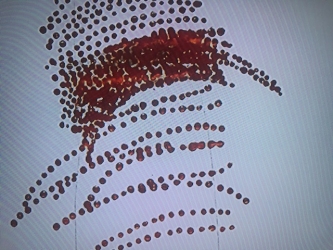
SEP 29 2020 - Christian Garcia Bello
Pongo mi pie desnudo en el umbral
Fundación DIDAC
19 september / 27 november
Curator: David Barro
Pongo mi pie desnudo en el umbral is an exhibition project with three layers: a short story written by me for the occasion, the exhibition’s device and a collaboration with the artist María Roja through a specific performance.
The title —a verse stolen from the galician poet José Ángel Valente— leads us to think of a story that could end or begin, but a story that goes forward by walking, touching, stepping, as happens in the short story that forms the backbone of this whole project and the exhibition.
This short story is the tale of a find: the travel diaries of a woman named Dirse who made a pilgrimage from Antwerp (Flanders) to A Guarda (Galicia), sometime between the 16th and 17th centuries, and who spent her last days on Mount Santa Trega, looking at the river mouth of the Miño, the threshold that separates Galicia from Portugal.
The exhibition is presented as a collection of fragmented and overlapping points of view on the history of Dirse that punctuate the room and articulate a spatial narrative around the landscape, spirituality, ritualism, architecture and vernacular forms.
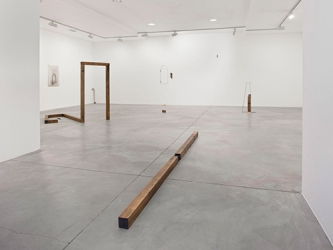
SEP 17 2020 - RODRÍGUEZ-MÉNDEZ
DANIEL BOCCATO
BAD ACTORS
Gillian Ayres / Pamela Bartlett / Sandra Blow
Daniel Boccato / Howard Dyke / Dominic Kennedy
David Ostrowski / Kes Richardson
KARST
Plymouth
28 de Septiembre — 9 de Noviembre |
|
Bad Actors is a painting exhibition that takes its cue from Pirandello’s play Six Characters in Search of an Author. The play calls into question the nature of reality, artifice and authenticity. Each artist will present one significant painting. All the paintings are ambitious in scale, either sharing or exceeding the proportions of the human body. They will be displayed informally – propped, wedged, or hung from the columns of the gallery – asserting a physical presence in the space. This exposes both the factual human activity of their making and the illusion of the picture plane, or the work’s character. Each painting utters a private monologue. These utterances will connect across the space to create interactions and a constantly shifting story. |
|
Daniel Boccato and Loup Sarion,
M+B is pleased to present Cannibal Valley,
an exhibition of new works by Daniel Boccato and Loup Sarion, the
artists’ first exhibition with the gallery and in Los Angeles. The
exhibition runs from September 14 through November 9, 2019, with an
opening reception on Saturday, September 14 from 6 to 8 pm.
Cannibal Valley brings
together the sculptural objects of Loup Sarion and Daniel Boccato,
united by the artists’ collaborative friendship and interest in abstract
figurative forms.
ttps://www.mbart.com/exhibitions/186/overview/
FAROL
Engel Leonardo proposes for the balcony of MAC Niterói the sample of a series of colored sculptures that have their origin in the drawings of Flávio de Carvalho. With its balcony as a privileged place - that certainly recalls the panoramic use of a lighthouse - each of the sections of the building will receive a sculpture that comes from the various elements extracted from Carvalho's project: door and tiles, in addition to the guacos and palms designed by the Brazilian architect.
visit websiteENGEL LEONARDO
Farol
MAC Niterói
Rio de Janeiro, Brazil
April 14 - August 4, 2019
JUL 27 2019 - Christian Garcia Bello
Almugárbas
Congratulations CHRISTIAN GARCÍA BELLO
Winner of the IV Prize Cervezas Alhambra with his project Almuqárbas |
|
The Almuqárbas project proposes a contemporary rethinking of the Mozarabic through with the design of a new module based on the poetic and geometric significance of the Alhambra of Granada. |
|
MONOGUAYABO
The relations between the human and the history, the architecture and the material culture are some of the central topics in the work of Engel Leonardo. His production is usually based on research on modern tropical architecture, stories repressed by modernity, and the transmission of indigenous and African knowledge through objects generally seen as handcrafted, folkloric or ethnographic.
In "Manoguayabo", the works use as a starting point the research on the work of Flavio de Carvalho and Lina Bo Bardi, as well as the painting "O lago" by Tarsila do Amaral and the traditional Dominican egg kills. Creating a conversation with the viewer which is developed through the use of structures of geometric character and modernist ancestry, Leonardo seeks to reinterpret elements of the nature of the Caribbean and the tropics; a reduction of forms, colors, and relationships that account for an immensely rich but equally complex context.
STONE SOAP GLORY
DANIEL BOCCATO
STONE SOAP GLORY
July 25 - September
Mister Fahrenheit
New York |
|
JUL 15 2019 - RODRÍGUEZ-MÉNDEZ
Lo Perfecto. Arriba* En
RODRIGUEZ-MENDEZ carries out an editorial and exhibition project for CICLÓN, coordinated by David Silva and Misha Bies.
Opening the 31 of July
Santiago de Compostela
The work of Rodríguez-Méndez analyzes the material principles of sculpture and the essential physical experience of man in projects that combine action and sculpture to explore the interaction or balance of energies between the two.
The artist's use of forms and materials such as cylinders, peat, oil, sound, words and the body are understood as intangible, as elementary or absolute geometries. These questions and conditions the processes of construction and decision making that leads to the final result.
Using languages of marginal influence in the exhibition space, Rodríguez-Méndez exploits the incorporation of materials and the open and latent state of their condition to configure a game of loss and restitution that testifies to the definitive and essential nature of life and change.
JUL 10 2019 - Sally Gutierrez
Margen de Error
SALLY GUTIERREZ y colectivo Declinacion Magnética
MARGEN DE ERROR
Bienal Sur
Montevideo y Lima |
|
JUN 8 2019 - Christian Garcia Bello
Only a few months after its official opening, Museo Patio Herreriano presented an ambitious exhibition entitled Cuatro dimensiones, a project that seeked to survey the developments in the field of sculpture taking the works in the Colección de Arte Contemporáneo as a point of departure.
Una dimension ulterior, installed in five large rooms on the second and third floors of our Museum, takes that show as a reference in order to explore the developments in the field of sculpture up until our present day. It is formed by some of the works included back then and many belonging to contemporary artists working today. If Cuatro Dimensiones eluded the grand tales of Art History, Una dimensión ulterior seeks to enhance the value of minor histories. This is why we have chosen the indefinite article “Una” (“a”) instead of the definite article “La” (“the”), because, as it is well known, there is no longer room for univocal readings of the art of our times, and the one we have here at stake is only one of many other possibilities. However, what we try to put forward here is our humble ambition to present some of today’s key aspects of sculptural practice.
Artistas participantes:
Ignasi Aballí, Elena Aitzkoa, Elena Asins, Jorge Barbi, David Bestué,
Elena Blasco, Jacobo Castellano, Jordi Colomer, June Crespo, Ángela de
la Cruz, Patricia Dauder, Diego Delas, Pepe Espaliú, Ángel Ferrant,
Nuria Fuster, Fernando García, Christian García Bello, Cristina
Iglesias, Pello Irazu, Carlos Irijalba, Antoni Llena, Eva Lootz, Juan
López, Asier Mendizabal, Mitsuo Miura, Itziar O Okariz, Jaime Pitarch, Adolfo Schlosser, Fernando Sinaga, Teresa Solar, Julia Spínola y Susana Solano.
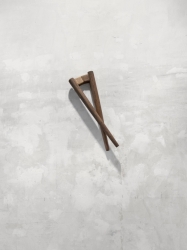
La Déesse verte
Établissant un parallèle entre les formes de l’art et les formes de
la nature, l’exposition prendra la forme ludique d’une vaste serre dans
laquelle les artistes créeront de nombreux paysages,
jardins, représentations mythiques, imaginaires et/ou historiques de
la nature, en lien avec l’art, les cosmogonies indigènes, la technologie
ou la science-fiction.
Artistes : Gwladys
Alonzo, María José Argenzio, Mariana Castillo-Deball, Carolina Caycedo,
Chelsea Culprit, Dewar & Gicquel, Naomi Fisher, Galerie Rezeda,
David Gumbs, Cristóbal Gracia, Cynthia Gutiérrez, Renaud Jerez, Lake
Verea, Lucile Littot, Engel Leonardo, Caroline Mesquita, Miguel Penha,
Calixto Ramírez Correa, Clémence Seilles, María Sosa, Fabiola
Torres-Alzaga.
Commissariat : Dorothée Dupuis
Estableciendo
un paralelo entre las formas del arte y las formas de la naturaleza, la
exposición tomará la forma lúdica de un gran invernadero.Para esta
exposición, la curadora Dorothée Dupuis se inspiró en el famoso jardín
de Las Pozas, un logro caprichoso y utópico, ubicado en el estado de San
Luis Potosí en México, por el poeta Edward James en la década de
1970.Sujeto de una guerra interminable tanto contra sus poderes
destructivos como por el control de sus recursos, la naturaleza es un
Eldorado que los humanos consideraron desde muy temprano como una deidad
simbolizada en diferentes mitologías por animales, figuras femeninas y
otras entidades a menudo antropomórficas.
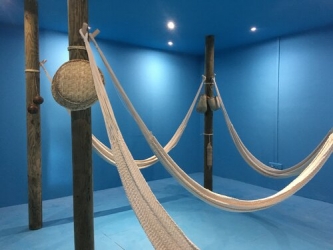
ABR 23 2019 - RODRÍGUEZ-MÉNDEZ
O artista galego Rodríguez-Méndezserá o gran protagonista doquinto e último Episodio de Creación Contempoánea de NUMAX co seu traballo Ir. A obra será presentada oluns 16 decembro ás 20:00nun acto que tamén contará coa presenza do comisario do ciclo, Ángel Calvo Ulloa.
A obra que ocupará a vitrina de NUMAX nas vindeiras semanas leva por título Ire fai parte dun traballo aínda en proceso que se presentou en 2018 na exposición Dos mesas Monte, acompañando outra obra titulada Región de validez que
o artista presenta así: «Desde o ano 2007, a miña nai (xastra de
profesión) confecciona, cada mes, un pantalón e unha camisa coas
dimensións do meu pai, que envía ao meu enderezo de Madrid nun paquete
que nunca abro. Unha acción que uso como pretexto para recibir e
acumular o meu nome escrito por ela, sobre unha embalaxe que contén unha
información física e actual de meu pai.»Ir dá continuidade ás
liñas de traballo máis persoais de Rodríguez-Méndez, un artista adscrito
ao campo da escultura cuxa obra adoita reflexionar sobre a súa propia
condición perecedeira e efémera. Un traballo de temporalidades moi
persoal que somete ao espectador, pero tamén ao propio artista, a unha
sorte de estrañamento a partir da impredicibilidade coa que actúan tempo
e materia.
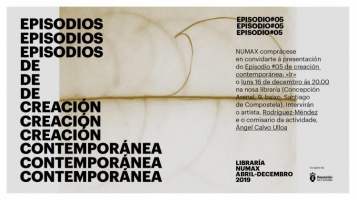
ABR 20 2019 - Mar Guerrero
Earth
ABR 10 2019 - RODRÍGUEZ-MÉNDEZ
Thinking about the gesture inevitably leads us to think about movement, a form of non-verbal communication in which the body, face or hands take the lead to transmit messages through other visible expressions. The gestural act implies a meaning, a determined intentionality that encloses a more complex reality, visible through small nuances enhanced by the instants experienced in shared contexts. This is where we question whether all space can be lived in terms of performativity, if the narrative of the gesture can be merged to amplify our links in a kind of new "affective management" that makes us participants in the spaces we now identify like ours. Reiterating the image to make it real is the basis of any performative process and is something also present in the symbolic construction, the alliance that exists between a signifier and a meaning.
RODRÍGUEZ MENDEZ
TOTALIDAD E INFINITO*
Economías de la transferencia en otro(s) tiempo(s)
Fragmentos que Representan al Mundo
EVA FÁBREGAS + ROSANA ANTOLI + LAIA ESTRUCH + GERARD ORTIN + RODRÍGUEZ MENDEZ
Sala Carlos Pérez del Centre del Carme de València
February - June, 2019
visit website
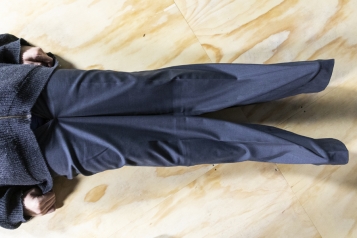
El juego del arte
Rothko committed suicide in New York, 1970. The figure of the painter was then evoked by Nacho Criado in one of his first solo exhibitions in the Sen gallery in Madrid, with a series of works that were framed in the minimalist poetics and that supposed a radical break with the proposals of Madrid's art scene then. With this and other works of that show, the artist considered the installation, which would be one of the lines that would guide his later creation. This work also assumes the introduction of color in the minimalist scheme, and in fact, compared to the usual neutrality of minimalism, this piece by Criado based a good part of its meaning on the chromatic aspect.The present work is constituted by several rectangular tables that, leaning on one another forming different angles and inclinations, reach the verticality in the wall. The tables create different strata or phases: a physical progression that affects the color in its luminosity and causes a series of gradations on the scale of the black, contained at its ends by the wood painted in red that act as a visual limit. Within the minimalist aesthetic in which this early work by Nacho Criado is included, innovative in the Spanish art scene, the dedication to Rothko acts as an evocation not only of the chromatic qualities of his painting, but also of an idea of absolute art that Simón Marchán has defined as "contemplative, pure and reductionist, in which the real and the virtual are already counterbalanced".
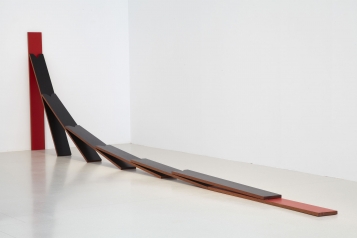
DIC 6 2018 - Clara Montoya
NADA Miami
Savage Carnival. Has only been celebarted in Bruselas for the past five years,but it brings together characters and costumes inspired by ancient traditions from around the world.Although the carnival as we know it today is a festival related to Christianity and Lent,its origins are much older and derive from the celebration of the summer solstice. Clara Montoya is a part of the community in charge of organizing this contemporary urban version of the festival each year.Although she normally works in sculpture,in this instance Montoya has decided to employ acrylic on canvas to portary her companions and their costumes Nonetheless there is a sculptural element to these vestments that resolves their relationship to the city space and the radical,festive aspects of performance, establishing the axes that traverse these paintings..In the savage carnival each participant makes their own costumes,reinterpreting examples from ancient pagan carnivals that in some cases are still being celebrated today ,in which the disguises represent ancestral fears and desires .The characters that roam the heart of the city throughout the day are Christmass tree warriors, monsters,half-human half animal beings, machine-men which are constructed in the days leading up to the celebration.At the end of the carnival many of the costumes are burned in a large bonfire.
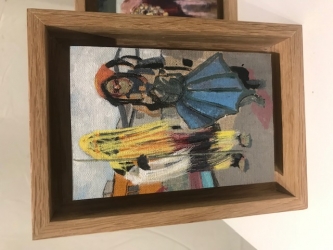
JUL 10 2018 - RODRÍGUEZ-MÉNDEZ
I say error / Digo error & The Perfect. On / Lo Perfecto. Arriba Llull
Traces et affects
Exposición de Miquel Mont .
Galerie de l’artothèque – Salle du Temple, place Notre-Dame, 35500 Vitré
Commissariat : Isabelle Tessier
Exposition visible du 2 juin au 16 septembre
ABR 20 2018 - vítor Mejuto
critics´ picks ARTFORUM
For centuries, the education of painters revolved around scrutinizing masterpieces in order to grasp how their makers resolved problems of a purely technical nature. No one looks at painting as mercilessly, and with as little sense of metaphor, as a painter. In “Pintor en la corte,” (Painter in the Court), Vítor Mejuto revisits
Diego Velázquez,
Antonello da Messina,
Jaime Serra,
Francisco Goya, and
Titian, among others. Mejuto’s small-format paintings are concise and honed, to say nothing of elegant, reproductions of the geometric aspects of some of those masters’ works.Despite its schematic proposal, the show is friendly, even domestic, because the images distributed around the gallery are familiar. Particularly suggestive is the 2018 series “sepulcro vacío” (empty grave). These works, hung in a somewhat scattered way along a wall, explore how different painters have treated a space miraculously unfilled: the gravestone and the ditch. Initially inspired by
Juan de Flandes’s
Resurrection of Lazarus, 1514–19, the series encompasses an assortment of tombs from over the course of art history that Mejuto has compiled. From these images, the artist has created paintings that are either imitations, interpretations, or inventions.
Viewers embark on a journey to decipher the fragments in Mejuto’s
paintings: a swath of robe, a wedge of building, a piece of brocade. The
small canvases, like lost puzzle pieces, conjure memories of complete
masterpieces. Abounding with citations and suggestions, the exhibition
reveals the contemporariness of the well-known images that form the
basis of Western art. It is with good reason, then, that a number of
titles reference burials and resurrections. Each generation pays, in its
fashion, its debt to its ancestors.
Translated from Spanish byJanie Brodie.—
Joaquín Jesús Sánchezhttps://www.artforum.com/picks/vitor-mejuto-75006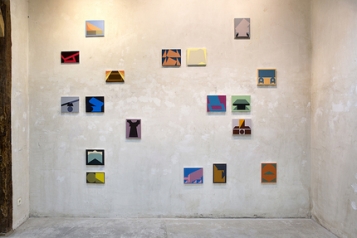
Daniel Boccato, You are not a tree, Corrugate Contemporary, Ohio, US
Exhibitions Daniel Boccato , You are not a

t
ree.
http://corrugatecontemporary.com
ABR 11 2018 - Loup Sarion
articles bombmagazine
Centinela exposición en TABACALERA
Centinela is the project that Daniel Boccato presents specifically for the studies of
Tabacalera. The ‘centinelas’ are watchful lions that are in a moment between action
and inaction while they watch us carefully from their posts. Descending from the
European heraldic traditions, it is common to find them today in gardens protecting
the doors of contemporary homes, directing their gaze to whoever accesses them or
thinks about doing so. Sitting on pedestals, these lions are concrete replicas of classic
sculptures, this time perched on objects from another era that have lost their function
over time.
The classic white pedestal generally acts as a separation between the sculpture and the
ground, between the object and the abject, art and architecture, high and low. The
attention usually tends to focus on what is dynamic, while the static is usually in the
background. Thus, when the sculpture becomes a constant and the support in a
variable, the roles are inverted and the sculpture becomes a support for the pedestal.
Daniel Boccato’s work explores the relationship between form and language,
abstraction and figuration, constantly challenging the spectator's impulses to label,
declare, categorize and differentiate. Unruly and even cumbersome, their pieces put
to the test the limits of painting, sculpture and drawing, made with industrial materials
such as agglomerates, concrete, polyester, as well as with ready-made objects,
presenting simple shapes of striking colors.
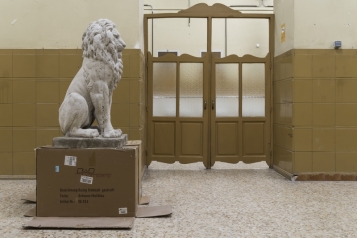
MAR 17 2018 - Justin Thompson
My paper is called The Medium is the Massage: Racialized Mediums
I am honored to be speaking at
Black Portraiture(s) IV: The Color
of SilenceMarch 22-24 at Harvard. I am delivering a paper based on the
past 8 years of research and interviews with artists of the African
Diaspora.
My paper is called The Medium is the Massage: Racialized Mediums
http://www.blackportraitures.info/sessions/the-artist-at-work/
MAR 16 2018 - Justin Thompson
project realized in collaboration with Bradly Dever Treadaway and Jason Thompson f
Here is a recent project realized in collaboration with Bradly Dever
Treadaway and Jason Thompson for the Miller Gallery in Kutztown PA.The Antenna of the Raceis
a media-based installation that centers on three conceptual
foundations: engaging Marshall McCluhan’s theory on historic labor
division as a primer for thriving in an ‘acoustic environment’, local
Pennsylvanian history in the patenting of a device capable of the
diffusion of public television and a critical deconstruction of
authenticity and cultural appropriation. McCluhan’s examination of the
simultaneity of the media assault sets the service culture as one of
playing roles in contrast to specialization and literacy of a ruling
class as pursuing goals, ultimately determining that the role players
are more capable of thriving in a hyper saturated acoustic world given
their forced adaptability.
MAR 4 2018 - Mar Guerrero
ART CENTER/SOUTH FLORIDA RESIDENCY
Mar Guerrero ha sido seleccionada para realizar una
estancia en residencia en Art Center/South Florida, Miami. Esta residencia es
una oportunidad que se ofreció a los artistas baleares participantes en el programa de formación “Les Clíniques d’Es
Baluard”, cuyo objetivo principal es fomentar la profesionalización del sector
y facilitar las herramientas de análisis, conocimiento, recursos y seguimiento
de la práctica creativa y de pensamiento desde el museo. Por ello, la
residencia en el Art Center/South Florida constituye una gran oportunidad para
conocer el contexto artístico de Miami así como los programas de formación de
artistas desarrollados desde esta institución artística. Esta residencia es
posible, además, gracias a la colaboración mantenida entre Es Baluard y el
Illenc. La residencia tendrá lugar durante el mes de marzo de 2018 y permitirá
participar a la artista en el Program for Applied Artistic Research.
http://www.artcentersf.org/
MAR 4 2018 - Sally Gutierrez
Te acuerdas de Filipinas ?
La pelicula de Sally Gutirrez participa en la ficci, Festival internacional de cine de Cartagena de Indias .
la pelicula Ta acorda Ba tú el Filipina forma parte de la coleccioón del Museo Nacional Centro de arte Reina Sofia .
http://www.ficcifestival.com
Conflictos
y dictaduras; colonizadores y colonizados; represión y ansias de
libertad; totalitarismo y democracia, se reúnen en esta segunda versión
de “La guerra y la paz”, ficciones y documentales que dejan oír voces,
reclamos, preguntas, soluciones. Películas que se hacen cargo del lugar
del cine no como un simple notario de la realidad sino como un
instrumento de transformación.
NOV 4 2017 - Christian Garcia Bello
OCT 20 2017 - Christian Garcia Bello
ARTFORUM
Christian García Bello.
If
Christian García Bello’s second show at this gallery seems to stage no major
overhauls of his first, progress nonetheless lies within the reaffirmation of
his perseverance. In this light, the exhibition represents a remarkable step
forward in his still-young career. Titled, somewhat awkwardly, “Ahora no es
pretérito todavía” (Now it is still not the past), the show reflects on how
our relationship with time informs our perception of space. His drawings and
sculptures share a precise blend of representation and abstraction,
mathematical rhetoric and transcendent nebulousness, as he draws from rigorous
classical humanism and from hazier Romantic movements in equal measure.
On entering the gallery, one easily detects the relevance of rhythm in
his exquisite installation. It stems from a careful study of human proportions
in the context of the gallery’s singular architecture. Drawing out our gaze, a
vertical wooden form expands toward the wall, punctuated by both drawings and
sculptures that share a distinctive ingredient: On all of them, thin layers of
wax subtly accumulate to produce dense surfaces with an enthralling aura. They
represent architectural motifs as well as shadows and hollow spaces,
relentlessly swinging between the tangible and the ethereal. The three wooden
sculptures on view are found objects that evolve into abstractions evoking a
melancholic sense of longing, while unambiguously reflecting shapes and symbols
drawn from traditional art of Galicia. Apathetic toward fuzzy trends and
unnegotiably committed to austere formalism, García Bello understands his work
as a body of complex textures providing a humble and serene take on the
infinite.
— Javier Hontoria
All rights reserved. artforum.com is a registered
trademark of Artforum International Magazine, New York, NY
https://www.artforum.com/?pn=picks§ion=eu#picks71555

OCT 6 2017 - Christian Garcia Bello
El Refugio de Garcia Bello
OCT 5 2017 - Mar Guerrero
Cosmic networks
is developing her project Cosmic networks at the Nirox Foundation (South Africa), within the residency program of El Ranchito de Matadero Madrid – AECID.
Dates: October 2017
SEP 22 2017 - Ana Esteve Reig
LA PANTALLA MAGICA
Ganadora de una de las 10 l becas BBVA Multiverso a la Creación en Videoarte en la convocatoria 2017, para llevar a cabo su proyecto La Pantalla Mágica.La comisión evaluadora ha estado presidida por Chus Martínez, directora del Instituto de Arte de la Academy of Art and Design de Basilea, e integrada por Laura Baigorri, Eugeni Bonet, Nuria Enguita,; Karin Ohlenschläger, María Pallier, Manuel Segade, ; Blanca de la Torre, y Virginia Torrente,
SEP 20 2017 - Christian Garcia Bello
Gallery weekend
SEP 20 2017 - Christian Garcia Bello
Seleccionamos aquí diez exposiciones que no deben faltar en este primer recorrido galeristico.
La segunda muestra individual en la galería Formato Cómodo de Christian García Bello (La Coruña,
1986) toma como punto de partida el Estudio filosófico del tiempo recogido en las Confesiones de San
Agustín y su definición del hombre como centro del universo. A partir de ahí, García Bello trabaja
con escultura y dibujo, tomando como escala de trabajo su cuerpo y como referente el paisaje y
la arquitectura más esencial
http://www.elcultural.com/revista/arte/El-arte-nos-recibe-en-casa/40018
Gallery weekend Bruselas
presents his new solo exhibition nut, nuts, nut job at the gallery Sorry we're closed in Brussels.
Fechas: 7 de Septiembre - 28 de Octubre 2017
JUL 17 2017 - Ana Esteve Reig
Tracing utopia
Somewhere. nowhere. Utopia.
Twelve young emerging curators from China and Germany will stage a joint exhibition following the traces of "Utopia". Inspired by their research on the contemporary curatorial practice at the documenta 14 in Kassel and Skulptur Projekte in Münster the team explores utopian thinking in matters of space and time by means of visual arts, installations, performances and interventions in the outdoor and indoor space.
The two-part exhibition will be presented at Starke Foundation in Berlin-Grunewald as well as at Zentrum für Kunst und Öffentlichen Raum and Schlosspark Biesdorf.
Participating artists:
Dominik Annies, Chen Baiyi, Janosch Becker, Florian Birk,Juan Blanco, Felipe Duarte, Shi Fu, Philipp Hainke, Lisa Herzog, Fangling Huang, Qin Lingsen, Luo Qiang, Li Quing, Ana Esteve Reig, Natalia Irina Roman, Felipe Sánchez, Liu Shihao, André Stache, Deo Gisa Brian Senyondo, Annika Stoll, Daniel Theis, Sabine Maria Voltz, Victoria Wald, Tao Xia, Yan Xiang, Ligeng Zhang
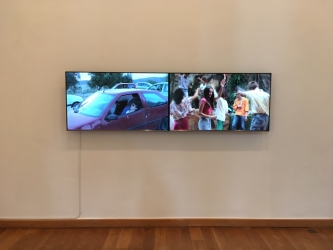
20th Sesc_Videobrasil
Associação Cultural Videobrasil and Sesc São Paulo announce the list of artists who will be participating in the 20th Sesc_Videobrasil Contemporary Art Festival, one of the leading plataforms for contemporary art in the Global South, to be held from October 2017 through January 2018 in São Paulo. Nearly 2,000 artists from 109 countries submitted works during the Open Call for the 20th Festival. The Brazilians Ana Pato, Beatriz Lemos and Diego Matos, and the Portuguese João Laia collaborated with the chief curator Solange Farkas, and were responsible for selecting the 50 artists from 25 countries who will showcase their works in this new edition.
Engel Leonardo
MAY 5 2017 - Christian Garcia Bello
BIENAL DE LALÍN
5 de mayo 21 de julio
LUGAR: Museo Municipal de Lalín
ARTISTAS: Emilio Araúxo, Misha Bies Golas, Emma Crichton, Manuel Eirís, Tamara Feijoo, Christian García Bello, Irene Grau, Rubén Grilo, Carlos Maciá, Álvaro Negro, Carme Nogueira, Kiko Pérez, Alejandra Pombo, Bandia Ribeira, Lua Ribeira, Rodríguez-Méndez, Armindo Salgueiro, Diego Santomé, Xoan Torres, Damián Ucieda e Diego Vites.
ARTFORUM
Placed at the back of the gallery was Lacking the Real (allworks 2016),
a folding screen composed of double-sided mirrors that reflected a
fracnrred image of Ana Roldán's exhibition "NO," including its visitors, while concealing what was behind it from any inquisitive
glances-a seemingly simple device that nonetheless introduced an
uncanny disruption into the space of the gallery. Lying o¡ the floor in
front of this reflective partition was Elsewbere, a flat, round stone
. across which a blue, many-armed form, like an abstract octopus,
extends a set of truncated tentacles. Here, too, a gap opened up in the
fabric of the real.
In his 1966 radio talk titled "The Utopian Bod¡" Michel Foucault
refers to our own bodies as "pitiless place" to which we are "condemnsd." And yet I shall never be able to see my own back, my own
head-and least of all the back of my head-in the same way I can see
úe things in front of my eyes. The former reveal themselves to my gaze
only if I contort myself physically or have recourse to a mirror. But as
he pursues these thoughts, Foucault slowly comes to the conclusion
úat the utopian moments offered by one's body's ineluctable presence
lurk precisely in its shaded depths and hidden corners.
In Roldán's work, however, the absence of the real does not simply
amourt to the failure of an integrated representation-for instance in
, úe series "Negative Bodies," which extended across an entire wall of
üis exhibition.'What shines forth in these works in black overpainted
, neon-which hang like the cryptic symbols of a latter-day writing on the wall-are precise copies of the curled shapes assumed by images of
snakes in encyclopedias or scientific publications. In this wa¡ a series
of simple models gives rise to mysterious forms, some open, some
closed; and these "negative bodies" can implicitly be understood as
glowing symbols of the body's utopian depths as described by Foucault.
Vanilla Ouerseas is a pair of square silk cloths printed with a series
of short, clear black lines formed by the silhouettes of vanilla pods.
Beneath them, the words of its title appear to sink into backgrounds
evocative of a bright or gray sky while the words cHANGE and T¡«B are
repeated across the entire surface. The Aztecs referred to the vanilla pod
as the "black flower." The colonial imperative to "take" it ensured that
it came to be cultivated far beyond the Gulf of Mexico, in many different colonies across the world. Today its placeless and historyless aroma
has become the epitome of a globalized culture of taste. For Roldán, who
comes from Mexico and now lives in Zurich, vanilla has become a key
symbol of the complexity of postcoionial dependencies, as well as of
the loss of biological and historical roots. Her work generally avoids the
explicit imagery of exoticism, which here appears only in the palm leaves
featured in high-contrast photograms lrom the series "Constructions,"
2012-, composed of photochemically fixed traces of light.
"NO," the exhibition's title, appeared in two small sculptures, one
composed of obsidian and the other of brass; but their costly mien, their
seductively shiny existence, seemed only to negate itself. The two letters
might initially remind us of Markus Raetz, whose anamorphic sculpture Crossing,2002, turns the word No into a vrs and back again. But
Roldán lets her "NO" remain as it is and keep its meaning, alluding to
different kinds of negation and self-dissolution.
-Hans Rudolf Reust
Translated from Geman by Nathaniel McBride.
ABR 27 2017 - RODRÍGUEZ-MÉNDEZ
Dende o Panóptico: Cada cela unha fiestra.
RODRÍGUEZ MÉNDEZ.
participa en la muestra Dende o Panóptico: Cada cela unha fiestra.
La
exposición O Vello Cárcere de Lugo. Da guerra á posguerra está
compuesta por un libro de memorias, notas y cartas de los presos a las
familias, entre otros. También forma parte de ella la recreación de una
celda individual en la época de la guerra
13 artistas repiensan
desde la actualidad la Vieja Cárcel. Para eso, la muestra Dende o
panóptico: cada cela unha fiestra, que reúne por primera vez una serie
de trabajos de diferentes figuras del arte gallega
Para recuperar
la memoria de las mujeres antifascistas borradas de la historia, el
módulo femenino acogerá la exposición itinerante Vermellas (Chamábanlles
rojas). Se componen de 20 paneles con textos.
Fechas: A partir del 28 de Abril, Centro Sociocultural O Vello Carcere de Lugo.
MAR 17 2017 - RODRÍGUEZ-MÉNDEZ
The perfect on
The Perfect on .
Rodriguez-Mendez curador Angel Calvo Ulloa.
El resultado del trabajo en la residencia Paulo Reis .
http://ateliefidalga.com.br/
A round-up of the best shows in the Spanish capital ahead of this year's edition of ARCO, which opens tomorrow BY JULIA MORANDEIRA ARRIZABALAGA FIREZE.COM
Critic’s Guide: Madrid
A round-up of the best shows in the Spanish
capital ahead of this year's edition of ARCO
by Julia Morandeira Arrizabalaga
Engel Leonardo, ‘Ansapit’
Galeria Formato Comodo
4 February - 31 March
Engel Leonardo’s practice performs a difficult
balancing act: synthesizing Caribbean geography and visual culture without
reducing its complexity. Research into the craft aesthetics of his native
Dominican Republic manifests through several forms. Titled ‘Ansapit’, the
Creole name for one of the four main land crossings from Haiti, the show shares
the name with a dress piece whose pattern documents the popular architecture of
the region. Leonardo’s Vevés paintings made with plantain juice and depicting
abstracted voodoo symbols, and his Lista series, which transforms traditional
basketwork found in the borderlands between the Republic and Haiti, further
explore porous limits: between neighbouring countries, art and design, and high
modernism and a craft vernacular.
https://www.frieze.com/article/critics-guide-madrid-0
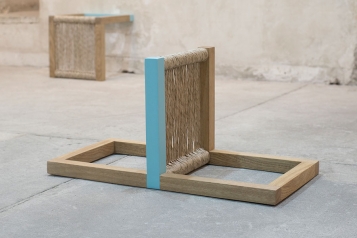
FEB 9 2017 - Javier Campano
Campano en color
ENE 16 2017 - RODRÍGUEZ-MÉNDEZ
"...al menos un modo provisional de asentarse en un lugar"
"...al menos un modo provisional de asentarse en un lugar" - Del 14 de diciembre al 22 de enero - Azkuna Zentroa (Bilbao) y del 20 de enero al 28 de febrero - Montehermoso (Vitoria-Gasteiz)
La exposición …al menos un modo provisional de asentarse en un lugar es el resultado del programa Komisario Berriak, iniciativa de DSS2016EU en colaboración con Azkuna Zentroa (Bilbao), Tabakalera (Donostia), Artium y Montehermoso (Vitoria-Gazteiz) que apoya la formación de nuevos comisarios. En estas tres ciudades han tenido lugar a lo largo de 2016 los encuentros en formato de laboratorios en torno a las prácticas curatoriales que concluyen con esta muestra
Artistas: Allora & Calzadilla, Emilio Araúxo, Pedro Barateiro, Zigor Barayazarra, Josu Bilbao, Alex Cecchetti, Lúa Coderch, Janice Kerbel, Irene Kopelman, Louisa Martín, Amaia Molinet, Enrique Radigales, Rodríguez-Méndez, Eriz Moreno, Eulàlia Rovira & Adrian Schindler y Tina Vukasović.
Equipo curatorial de Komisario Berriak: Valerio Del Baglivo, Ángel Calvo Ulloa, Irati Irulegi, Laura Diez, Leyre Goikoetxea, Natasha Kadin, Pilar Cruz, Iker Fidalgo, Sonia Fernández Pan y Juan Luis Toboso. Acompañados por Aimar Arriola, Tamara Díaz Bringas y Sabel Gavaldón.
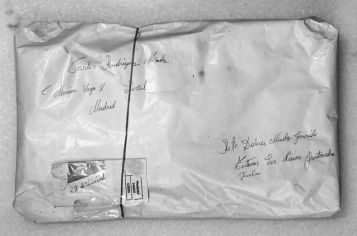
Bienal Tropical
Entre palmas, fritanga y
salitre, la Segunda Gran Bienal Tropical se realizará del 7 al 10 de diciembre en
varias localidades de Puerto Rico. Esta edición le rinde homenaje a dos
secretos a voces de la escena artística local y dos de sus figuras más emblemáticas:
Zilia Sánchez (La Habana, 1928) y Esteban Valdés (Ciudad de México, 1947).
La curaduría de la Segunda Gran Bienal Tropical es un
ejercicio en colaboración entre Marina Reyes Franco, Radamés “Juni” Figueroa,
Jesús “Bubu” Negrón (ganador de la Piña Dorada en la 1ra Gran Bienal Tropical),
Stefan Benchoam y Pablo León de la Barra.
Históricamente, las bienales en Puerto Rico han
sido boicoteadas, canceladas, retrasadas, convertidas en trienales y vueltas a
posponer. Exitosas, desacertadas, pertinentes o controvertidas, la constante
ha sido su carácter interrumpido, dependiente del vaivén político, la
militancia de los artistas y el presupuesto disponible. Quizás no haya mejor
momento que el décimo aniversario de la recesión económica en Puerto Rico para
-a cinco años de su primera edición- realizar la 2da Gran Bienal Tropical,
financiada a través de la economía de la amistad. Con el deseo de enfrentar
futuros inciertos, y seguros de que nuestro paraíso no sólo será fiscal, se ha
invitado a una selección de artistas de latitudes caribeñas, tropicales y del
más allá, a compartir su trabajo en una exhibición
playera/selvática/comunitaria y varios días de actividades a través de la isla.
Esta es una bienal de sus tiempos: desplegable y versátil, adaptable, sin presupuesto
y sin cargos por envío.
Adriana Lara
Adriana Martínez
Andrés Pereira Paz
Caribbean Backbone Research Institute
Daniel Steegmann Mangrané
Eduardo Navarro
Engel Leonardo
Gala Berger
Jessica Kairé
Jorge González
Marcelo Cidade
Opavivará
Vivian Suter
Sección de Autogestión:
En
un espíritu de apertura, colaboración, improvisación y auto-gestión,
los curadores de la Segunda Gran Bienal Tropical invitan a todo aquel
artista/colectivo que desee participar a traer sus propias obras e
instalarlas personalmente en el Km 13 de la Carretera 187 en las playas
de Piñones, Loíza el sábado 10 de diciembre a partir de las 10am.
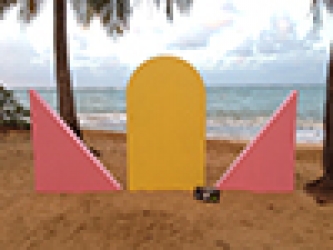
NOV 10 2016 - Sally Gutierrez
MULTIVERSO
Works from Nacho Criado will be presented at the Juan March Foundation in the exhibition
Works from Nacho Criado will be presented at the Juan March Foundation in the exhibition
- Escuchar con los ojos. Arte sonoro en España, 1961-2016
The
exhibition Listening with the eyes, Sound Art in Spain (1961-2016) was
created thanks to the invited curators José Iges and José Luis Maire,
and with the collaboration of many other artists and experts. Its aim is
to show the origins, the diversity of the trajectories and the vitality
of the Art Sound made in Spain since 1961.
Through
the extended range of more than 400 selected works and a large
documentary material, the exhibition wants to make visible (and above
all audible) the sound organised with artistic criterias in Spain, even
in times (during the 60's and 70's) when the proper term “Sound Art”
hadn't been created yet.
Dates: October 14th, 2016 - January 15th, 2017
Loup Sarion + Daniel Boccato
LOUP
SARION + DANIEL BOCCATO
LE
GÉANT DE LA DIGUE
october
1, 2016
Asphalte CharleroiHigh
on Place de la Digue stands the elegant outline of a figure.
Sometimes it appears to be sleeping. At others, it is dancing. This
sculpture, neither man nor woman, neither adult nor child, has been inspired by
giants. Just as we dress up folkloric characters to suit the season, this
figure transforms as the year progresses.
At
once a public bench, an esplanade and a family-sized picnic table, the giant is
a meeting point, but it is also a collection of climbable shapes of different
heights. As a deconstructed puppet, each part of the Géant de la
Digue’s body is interchangeable: the hand can easily become a crown, or
the leg a sword.
Asphalte Charleroi
Non figuratif — un regain d’intérêt ?
Exposición colectiva comisariada por Caroline Bissière & Jean-Paul Blanchet
con los artistas : Miquel Mont. Farah Atassi, Francis Baudevin, Vincent Beaurin,
Lisa Beck, Trudy Benson, Martin Bissière, Jessica Stockholder, Soizic Stokvis,
Blair Thurman, Delphine Trouche, Janaina Tschäpe, Emmanuelle Villard, Sophie Whettnall, Wallace Whitney,
Peter Zimmermann .
www.cacmeymac.fr
REELER LA COLECCIÓN CGAC, COMISARIO Santiago Olmo
Distanced Traces
FORMATOCOMODO presents the performance:
TRAZAS DISTANCIADAS by MIQUEL MONT
May 31st at 9pm.«Trazas
Distanciadas» (Distanced traces) is a reflection around a serie of
projected images, taking the form of perfomative conference. It builds
itself according to a free association between images and ideas,
contrasting so with the analytic constructions of the ruling discourses
and its rhetorical patterns. Privileging the sensible, the subjective
-that belong to the perception as pattern and place of the knowledge’s
subject-, and relating it with the economic, social and aesthetic order
of our time.
Sound Art in Spain (1961–2016)
ExhibitionSound Art in Spain (1961–2016)
February 10 – May 21, 2016
The exhibition spaces: Palma, Cuenca and Madrid
Sound Art in Spain (1961–2016)
traces the origins, history, diversity and vitality of the sound art
produced in Spain from 1961 to the present. By means of the range and
variety of works selected and extensive documentation, it purports to
make visible (and, above all, audible) the ways in which sound has been
employed to create artistic works in this country as far back as the
1960s and 1970s – decades before the term 'sound art' was coined to
describe this phenomenon.
In addition to providing a fresh look at works from the foundation's own collection, Sound Art in Spain (1961–2016)
will highlight the contributions of Zaj, Isidoro Valcárcel Medina and
Lugán (Luis García Nuñez), whose pioneering experimental and
cross-disciplinary works paved the way for the emergence of sound art as
a genre, as well as an overview of works by a wide variety of other
artists such as Walter Marchetti, Juan Muñoz, Francisco López, José
Antonio Orts, Eduardo Polonio, Esther Ferrer, Juan Hidalgo, Wolf
Vostell, Javier Aguirre, Nacho Criado, Francesc Abad, Eugènia Balcells
and Eugeni Bonet.
http://www.march.es/arte/palma/exposiciones/arte-sonoro/espacios.aspx?l=1
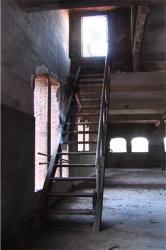
The New york times .ART REVIEW
Art sequana: Dé-Faire LA PEINTURE
Miquel mont participa en la exposiciòn colectiva en Le havre, "Dé-faire la peinture" junto con un coloquio
www.lehavre.fr/node/39934
OCT 9 2015 - Samuil Stoyanov
Focus Bulgaria at viennacontemporary 2015 by Open Arts Foundation and Sariev Contemporary
Focus Bulgaria at
viennacontemporary 2015 is the first overview of Bulgarian contemporary
art at an international art fair. It consists of a thematic exhibition
(curated by Iara Boubnova and Vessela Nozharova), of panel discussions
and informal talks (curated by Dessislava Dimova), of historical
comments on the context in the country, of quotations and explanations
as well as of a publication (conceived by Boris Kostadinov).
Samuil Stoyanov's work at Focus Bulgaria is:
20
Billion Stars, 2012
Action, ceramic stars,
photographs, plexiglas
The
present work "20 Billion Stars" is part of a series of similar boxes
and uses as material photo-documentation and artefacts of action (of the same
name) held by the artist for 30 days in the summer of 2011.
During the renovation of the central square of his home-town (Dobrich,
Bulgaria) Samuil Stoyanov goes regularly to the work-site and casts ceramic
stars from red clay in the still wet concrete. Inlaid and built up stars
creates a new map of a universe, which, unfortunately, will probably remain
undiscovered forever.
The square
named "Svoboda" (Freedom) has a total area of about 150,000 square
meters, which are overlapped entirely.
The
funding of the reparation of "Freedom" Square is OPRD of the European
Union and the action of the artist is made within the project "Art of
Urban Intervention", which is supported by the Culture Programme of the
European Union.
Focus Bulgaria at viennacontemporary 2015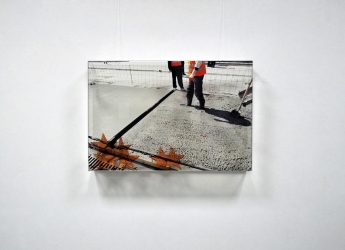
Art in public space
Vlatka Horvat Ana Roldán AAA: Art Altstetten
Albisrieden Art in public space Zurich 13 June 13 September 2015Zurich Contemporary Art Weekend
13/14 June, 2015 from 11 AM - 5 PM
www.stadt-zuerich.ch/aaaAAA: Art Altstetten Albisrieden
Public space of Zurich Altstetten and Zurich Albisrieden
AAA: Art Altstetten Albisrieden will feature nearly 30 artists challenging
theirselves with the questions of city development, neighbourhood history,
aesthetic in public places and other themes rooted in the urban context. The
artworks will be grouped in several geographical clusters that are
Vulkanplatz/Lindenplatz, Flurstrasse/Zollfreilager, the heart of the
Albisrieden village and the Eichbühl cemetery. Several satellite projects are
also planned in the Zürich-West area.
Curators: Christoph Doswald, Bettina Burkhardt (project direction)
Special events: Jun 12, 5pm - 9pm, opening
- Open: Saturday, 13 June 2015
- Close: Sunday, 13 September 2015
- Address: Public space of Zurich Altstetten and Zurich Albisrieden
- Web: https://www.stadt-zuerich.ch/aaa
- Admission: Free
- Transport: Vulkanplatz, Bahnhof Altstetten
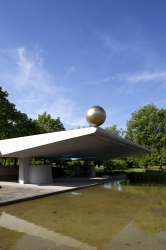
JUN 5 2015 - Christian Garcia Bello
Como Tizón Quemado, CGAC, Centro Galego de arte contempóranea
Comisario/a: Alberto Carton
Artista: Christian García Bello
6 marzo - 14 junio 2015
Como
tizón quemado es una agilización del proceso creativo de Christian García Bello (A
Coruña, 1986) hacia la rotundidad contenida del gesto, y hacia la severidad a
ultranza de un carácter en evasión concreta y ciertamente radical. Esta evasión
es fidelidad hacia uno mismo, hallazgo de lo temporal que tiende y se
estratifica hacia lo superior; y es atributo de la individualidad trascendente
que, además de la integridad que se le exige, es también producto de la
inflexión de la reflexión y su conversión en objet la materialidad
tridimensional, no equívoca y, menos aun, derivativa y desinencial, en la cual
refugiarse, hallarse, y refundarse. La complexión no banal de la
instalación
site-specific establece
una unidad lógica con el espacio (vacío, luz y ciertas perspectivas aparentes)
que particulariza el medio envolvente, y lo torsiona en una sucesión de
tensiones verticales y horizontales reivindicativas de una geometría pura y
razonada. Y la utilización de la madera, del grafito, de la cuerda, texturiza
esa armazón primaria, insistente y focal, afirmación de lo inviolable del
hombre y de su unicidad sustantiva.
http://cgac.xunta.es/ES/exposicion-detalle/55/christian_garcia_belloGAL#ad-image-0
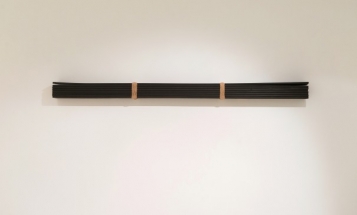
the new york times . FORMATOCOMODO
I Would like to share this article by Roberta Smith for de New York time .
JUN 2 2015 - Justin Thompson
American Academy of Rome
Justin Thompson -4_May 26th, American Academy of Rome, Rome, Italy curated by
Lyle Ashton Harris , Robert Storr and Peter Benson Miller
Nero su Bianco is a wonderful group show that I am honored to be a
part of. I will present a new work called Loquens de Fluminibus. My piece
draws upon an interview I did with Terry Adkins in 2010 and is a sculptural
sound work and film.
http://www.aarome.org/it/content/nero-su-bianco
ABR 14 2015 - Justin Thompson
Justin Randolph Thompson en Itinerarios. Fundación Botín
Itinerarios
is a yearly event which presents work by awardees of the Botín
Foundation"s Visual Arts Grants. Year after year, it acts as a
thermometer gauging the current state of the art world and it also
provides a snapshot of its predominant trends.
Itinerarios XXI
features works produced in 2013-2014 by nine artists: Carles Congost
(Gerona, 1970), Albert Corbí (Valencia, 1976), Patricia Esquivias
(Caracas, 1979), Jon Mikel Euba (Vizcaya, 1967), Rodrigo Oliveira
(Portugal, 1978), Wilfredo Prieto (Cuba, 1978); Julia Spínola (Madrid,
1979), Justin Randolph Thompson (Peekskill, NY, 1979) and Jorge Yeregui
(Santander, 1975).
his
year"s event explores the idea of the work of art as a medium to help
viewers visualize processes. Over the last few decades the idea that the
relevance of an artistic process, above and beyond its exhibition, is
contained in the various stages of the project and its production, as
opposed to the traditional concept of finished artworks ready to be
accepted and consumed, has gained strength.
Using installations, documents, images, videos and relics, the artists of Itinerarios XXI exhibit the traces of their personal research processes to create a unique and though-provoking space for visitors.
http://www.fundacionbotin.org/exposicion/itinerarios/index.html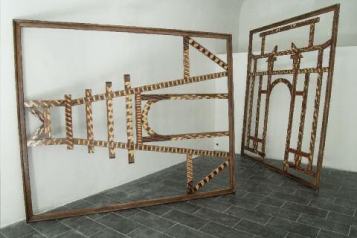
Miquel Mont, Nunca es suficiente 13/02/2015 - 25/04/2015
Miquel Mont, Nunca es suficiente
13/02/2015 - 25/04/2015
Opening: 12/02/2015, 7 p.m.
13/02 - 25/04/2015 Monographic
show of Miquel Mont, an artist born in Barcelona who lives and works in
Paris for over two decades. In his work, Mont seeks the most essential
part of painting.
The exhibition brings together some of the
latest production of this artist, with works made between 2007 and 2014
and is divided into four areas, which correspond to the four series
presented:
Cooperaciones, Lapsus, Mono-Tonos and
Ideological Collages. http://www.fundaciosunol.org/exposicions/exposicions.php?sub=0&id=99
ENE 27 2015 - Guillermo Mora
9ª Biennal d’Art Leandre Cristòfol
Guillermo Mora participa en :
9ª Biennal d’Art Leandre Cristòfol
Comisariada por Gloria Picazo
Inauguración: 31 de enero a las 12h.
Artistas: Eva Fàbregas,
Marco Godoy, Andrés Jaque, Mercedes Mangrané, Guillermo Mora, Juan Pérez
Agirregoikoa, Teresa Solar, Julia Spínola, Àlex Trochut + Xavier
Mañosa, Antònia del Río, Mauro Vallejo i Verónica Vicente.
Imagen --Dos casi cuatro, 2014 / 40 kg. de pintura acrílica sujeta por gomas elásticas / 56 x 25 x 46 cm.
Centre d’Art La Panera
Pl. de la Panera 2, 25002 - Lérida
www.lapanera.cat
ENE 27 2015 - Teresa Solar Abboud
9ª Biennal d’Art Leandre Cristòfol
Teresa Solar Abboud participa en :
9ª Biennal d’Art Leandre Cristòfol
Comisariada por Gloria Picazo
Inauguración: 31 de enero a las 12h.
Artistas: Eva Fàbregas,
Marco Godoy, Andrés Jaque, Mercedes Mangrané, Guillermo Mora, Juan Pérez
Agirregoikoa, Teresa Solar, Julia Spínola, Àlex Trochut + Xavier
Mañosa, Antònia del Río, Mauro Vallejo i Verónica Vicente.
Centre d’Art La Panera
Pl. de la Panera 2, 25002 - Lérida
www.lapanera.cat
Take Position: Bodies and Plants
Exhibition
Ana Roldán--
Bodies
and Plants--
Cordial invitation to opening at the galerie annex14 in Zurich
Ana Roldan 'Take Position: Bodies and
Plants'
Opening: 29. January 2015, 18:00-20:00
Exhibition: 30. January - 7. March
We. - Fr. 12:00-18:00 / Sa. 12:00-16:00
Galerie annex14, Hardstr. 245, 8005 Zurich
http://www.annex14.com/annex/index.php?id=2
DIC 12 2014 - Samuil Stoyanov
PREHOD for Sale
Samuil Stoyanov participa en la exposición colectiva .Prehod for sale , Comisariada por Iara Boubnova.
Artists: Anton Terziev, Alexander Kiossev, Alla Georgieva, Boryana
Rossa, Vito Valentinov, Dimitar Dilkov, Dimitar Solakov, Zoran Georgiev,
Ivan Moudov, Iskra Blagoeva, Kalina Dimitrova, Kalin Serapionov, Kamen
Stoyanov, Kiril Prashkov, Krassimir Terziev, Luchezar Boyadjiev,
Mariela Gemisheva, Nedko Solakov, Pravdoliub Ivanov, Rada Boukova,
Samuil Stoyanov, Svetla Gradanska, Zara Alexandrova, Stefan Nikolaev
ica-sofia.org
NOV 20 2014 - Omar Mahfoudi
ANA Roldán. Site-specific work for Swiss Re
ANA Roldán. Site-specific work for Swiss Re
RICK-LIFE.MDF, lacquer 92 x38 x40 cm
You are resting on the foundations of the company’s business −
life and risk − while resting on an art piece that allows you to look at
great works by Tatsuo Miyajima and Olafur Eliasson.
http://www.artatswissre.com/flash/index.cfm
Two shiny lacquered chairs, one black, one white, face the
glass fronted alcoves that look onto the central lift shaft of our
Zurich headquarters. Commissioned especially for the space (to mark our
150th anniversary in 2013), the back frame of each chair incorporates a
four letter word. One reads RISK, the other LIFE, reflecting our core
business.
Therefore, for the audience, ie our employees, Roldán chose a form
that is double coded. As chairs, her work can be easily used: “You are
resting on the foundations of the company’s business − life and risk −
while resting on an art piece that allows you to look at great works by
Tatsuo Miyajima and Olafur Eliasson. I wanted to invite people to sit in
these specific balconies to contemplate the art pieces”. “Of course”,
says Ana Roldán, “there are more complex ways to read the piece. While
sitting on it, you can’t see it while you perceive other art pieces. Its
visual disappearance is the condition of art contemplation.” It is a
sculpture that pretends to be a chair, whose backrest is a sculpture of a
word written in a typography Roldán developed.

OCT 14 2014 - Teresa Solar Abboud
OCT 10 2014
UNDER(DE)CONSTRUCTION en el KREATIV-QUARTIER

Exposición UNDER(DE)CONSTRUCTION en el KREATIV-QUARTIER en Múnich
Exposición colectiva comisariada por Laura Sánchez Serrano con los artistas: The
Chapuisat Brothers, Jonas Etter, Folke Köbberling, Florian Lechner,
Boris Maximowitz, Michael Schrattenthaler, Hisae Ikenaga y Nicolás
Combarro.
La exposición
consiste en intervenciones in situ en lo que fue un antiguo cuartel
militar y que desde hace unos años es ocupado por colectivos artísticos
de diversas disciplinas. El Kreativ-quartier pretende ser en unos años
un lugar rehabilitado para que viviendas y laboratorios artísticos
convivan.
OCT 7 2014 - Teresa Solar Abboud
Foreign Office by Michael McCanne Brooklyn Rail, Inc. Brooklyn, NY 11222
MAY 23 2014 - Teresa Solar Abboud
ALL THE THINGS THAT ARE NOT THERE
From 13.06.2014 to 31.08.2014 at Matadero Madrid, inside the Nave 16,
will be shown the video All the things that are not there, 2013, by Teresa Solar Abboud.
Official selection of PhotoEspaña 2014.
http://www.mataderomadrid.org
www.phe.es

MAY 22 2014 - Justin Thompson
Thompson is a recipient of the 2013 Louis Comfort Tiffany Foundation Award
TIFFANY FOUNDATION 2013 BIENNIAL GRANTS The Louis Comfort Tiffany Foundation is pleased to announce $600,000 in awards to American contemporary artists. Established in 1918, the Louis Comfort Tiffany Foundation remains one of the largest single sources of unrestricted monetary awards to artists. The present Biennial Competition, a format established in 1980, has over the years granted $8,534,000 in awards to 441 artists nationwide. The Foundation’s Biennial Competition represents its continued mission to honor its founder Louis Comfort Tiffany by enriching the growth and experimentation of artists with direct financial support. Angela Westwater, President of the Foundation, commented, “Our Trustees remain committed to supporting excellence in contemporary art, and in so doing commemorate our founder, Louis Comfort Tiffany, and his artistic legacy.”
www.louiscomforttiffanyfoundation.org2013 Biennial Competition Jury: Phong Bui, artist and publisher of The Brooklyn Rail Chrissie Iles, Curator, Whitney Museum of American Art Kathryn Kanjo, Chief Curator and Head of Curatorial, Museum of Contemporary Art San Diego Charles LeDray, artist John Perreault, curator, critic, artist, poet and founder of Artopia Cindy Sherman, artist Robert Storr, artist, critic, and Dean of the Yale University School of Art
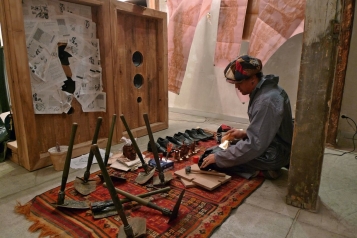
MAY 21 2014 - Guillermo Mora
solo exhibition Nunca casi nunca a veces siempre,
Guillermo Mora presents the solo exhibition Nunca casi nunca a veces siempre, curated by Fernando Gómez de la Cuesta.
CASAL SOLLERIC ZONA BASE, PALMA DE MAIORCA
21.05.2014 - 20.07.2014
www.solleric.org
MAY 21 2014 - Teresa Solar Abboud
Video All the things that are not there
Teresa Solar Abboud will show her video All the things that are not there, 2013, at the Spanish Fresh Film, held at the KING JUAN CARLOS I OF SPAIN CENTER of New York. The projection will take place the 14 th of may at 7.00PM

www.spainfreshspace.com/#!spanish-fresh-films/c1sxi
MAR 13 2014 - Guillermo Mora
Eight extraordinary spatial questions.
Mora rebels
against the tyranny of painting’s vertical plane and reinstalls it in the
horizontal and transverse.
At the
same time, this new representation produces another novelty: from liquid to
solid, from disconnected letters with which the artist builds a discourse, to a
story completed in one fell swoop, done in one stroke, proving that the medium
is reinvented, that painting always has something new to say in the artist’s
expression.
From
small scale to the largest, with no apparent inbetween, gigantism is part of
Mora’s new work, introducing architecture as the third element that joins
painting
and sculpture, and in which the building that houses this exhibition takes on
special relevance. The artist goes on to describe: “Given that my idea to raise
a plane of paint off of the floor and make it float is impossible (simply due to the law of gravity), this should be
secured in some way by the architecture that surrounds it. And if it were the
architecture of the space itself that contained the work? In the same way that
I have been working for years with different systems that contain paint, this
new project will use the architecture not only as a container but also as an
activator of the piece. The walls and columns of Tabacalera can contain the
plane of paint, secure it. In the same way that the
wall
has always supported painting, the architecture will give me the chance to be
able to support a pictorial plane. Embed it within, forcefully boxing it in,
the plane of paint can be supported and contained in the space and give it a
sense of active exhibition.”
The artist
is fascinated by the perception and comprehension of painting, to the point of
taking it to the limits of its context, converting it not into medium
but into the message itself, into
essence of expression, into something so literal that it takes on an extraordinary
physical force, almost paranormal, forming part of the exhibit halls of
Tabacalera.
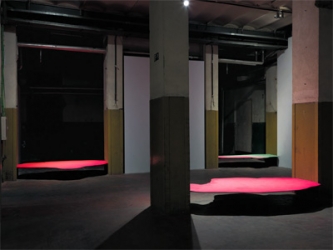
NOV 23 2013 - Guillermo Mora
Guillermo Mora, of the Formato Cómodo Gallery, wins the AUDEMARS PIGUET Award to produce a work of art at ARCOmadrid 2014
Paris, 19 November 2013.- Guillermo Mora (Alcalá de Henares, 1980), the artist nominated by the gallery Formato Cómodo, has won the Audemars Piguet prize to produce a work of art to be shown in the Audemars Piguet space of the VIP Lounge during ARCOmadrid 2014, which will be held from 19 to 23 February.
The jury was formed by Octavio García, artistic director of Audemars Piguet; Ángeles González Sinde, creator and former Minister of Culture; Soledad Lorenzo, gallery owner; Marga Paz, director of the Museo Reina Sofía Friends Association; Laura Revuelta, editor in chief of ABC Cultural; and Carlos Urroz, director of ARCOmadrid. They were keen to emphasise the great quality of the nearly 50 projects submitted by galleries and artists from around the world.
In the end, the prize, which consists of €15,000 to produce the work, was won by the project "cr_O_ma", by Madrid artist Guillermo Mora. The jury highlighted "the piece's investigation of colour, painting and sculpture, resulting in a new line of work in the promising career of this young artist". In the same way, it maintained the spirit of the brand's message: "There are exceptions to every rule".
Guillermo Mora
With a degree in Fine Arts from the UCM, he finished university with the First National Four-Year Degree Prize. In 2006 he received a scholarship to The School of the Art Institute of Chicago (USA) with the support of the BANCAJA Foundation, and he later obtained a postgraduate scholarship from the La Caixa Foundation. Noteworthy among his prizes and grants are the 2013 Caja Madrid Generation Prize, the Spain Academy in Rome Scholarship (2010-2011), a Visual Arts Production Grant from the Community of Madrid and an Honourable Mention in the 10th ABC Art Prize. His work has been shown at MACUF, the Elgiz Museum (Istanbul) and La Casa Encendida and at fairs such as ARCO, MACO and FRIEZE, and will shortly be exhibited at the ICA in London. He is represented by the galleries Formato Cómodo (Madrid) and Casa Triângulo (Sao Paulo).
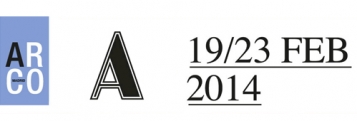
NOV 22 2013 - Carrasco & Mateos
The Best Photobooks of the Year: Martin Parr takes his pick
¡AHLAN!
By Nuria Carrasco, Self-published
Another zine which echoes a magazine format, this time Hello! magazine. The subject is the struggle for the liberation of three generations of refugees in the Sahara desert. So we are invited to go in[side] various tents, meet families etc, all in the style of Hello!. This, together with some brilliant pastiche ads, makes one the best photographic statements of the year.
NOV 16 2013 - Guillermo Mora
Painting ideas. Curated by David Barro
2014. ANTES DE IRSE. IDEAS SOBRE LA PINTURA
Curated by David Barro
Opening: 14th november, 20 h.
Artists: Miren Doiz, Jerónimo Elespe, Philipp Fröhlich, Santiago Giralda, Laura González Cabrera, Guillermo Mora & Alain Urrutia.vv
SEP 22 2013 - Samuil Stoyanov
5th Moscow Biennale
The Fifth Moscow Biennale of Contemporary Art will be held from 19 September-20 October 2013 at Manege in Moscow.
5th Moscow Biennale "Bolshe Sveta / More Light"
20 September - 20 October 2013 (opening Sept. 19)
Venue: Manege exhibition hall, Moscow
Curator: Catherine de Zegher
http://5th.moscowbiennale.ru
JUL 22 2013 - Justin Thompson
sculpture Brutus Jones
Thompson is a 2013 Emerging Artist Fellow at Socrates Sculpture Park where he will be creating the monumental sculpture Brutus Jones in residence this July. The exhibition of new fellows opens September 8th and Thompson will be doing a performance.
www.socratessculpturepark.org
JUL 4 2013 - Guillermo Mora
04.07.2013 - 13.10.2013 ELGIZ 13 Una nueva selección de la colección Elgiz se mostrará en el área de exposiciones temporales del museo
ELGIZ 13
A new selection from the Elgiz Collection will be displayed in the changing exhibition area of the museum. The title ‘13’ represents the 13 years of the Elgiz Museum as well as the year 2013. Newly acquired artworks will be shown including paintings, sculptures and video installations. Some of the artists whose works can be viewed at the exhibition are Julian Opie, Tony Cragg, Guillermo Mora, Aimée Zito Lema, Ray Harris, Veljko Zejak, Giuseppe Belvedere, Alexander Liberman.
/www.elgizmuseum.org
JUN 17 2013 - Teresa Solar Abboud
All the things that are not there
“All the things that are not there” is an audiovisual project based on the work of an American engineer called Harold Edgerton. Edgerton is the inventor of the strobe light, the underwater photography and the camera used to record the first developments of the atomic bombs.
The work is based on recordings of a road trip through the USA visiting different spaces related to Edgerton. As the entrance to these places are forbidden in most of the cases, the work has been completed with fictional reconstructions of themselves.
Color, sound. 40 mint.
MAY 1 2013 - Carrasco & Mateos
¡AHLAN!
On 9 May, the gallery presents FORMATO magazine! AHLAN! by artist Nuria Carrasco. The title is the translation Saharawi "Hello" and the publication is a fake of famous celebrity magazine which holds that header.
ABR 25 2013 - Guillermo Mora
HOLDING THE LINE
HOLDING THE LINEMeeting with Guillermo Mora & Pía CamilThe main purpose of this meeting is to present the methodolical system used by Pia Camil and Guillermo Mora for the development of the installation No A Trio A, a system based on the previous creation of several maps of images that help to generate formal, symbolic and conceptual relations for the development of a project.La Casa EncendidaRoom 2026:30 - 7:30 pm. Presentation of the project No A Trio A7:30 - 8:00 pm. Debate
ABR 19 2013 - Samuil Stoyanov
Samuil Stoyanov at Sofia Contemporary 2013:
10 min National Museum of Natural History
a project by Samuil Stoyanov
Samuil Stoyanov's site-specific space portraits series started with the Geocidite building in Belgrade where the 53rd October Salon took place in 2012. To study these modernist spaces of display and presentation, the artist first destabilizes the light, the fixed element of every space as such. Through these portraits every building he interacts with becomes a part of Stoyanov's artistic cosmos. In a gesture of hurling a light bulb above his head making the largest possible circle, Stoyanov, in his own words, makes reference to the movement of the space objects in the universe. Here the figure of the artist appears not only as a pseudo-scientist conducting inventive experiments but also as a black hole holding all the centrifugal movement in an orbit around him. The artist chose the Natural Museum of History in Sofia for the venue of his first-time such experiment in Bulgaria of a site-specific portrait as museum is a classic display place for geological history.
Where: National Museum of Natural History
When: 19 April – 12 May, 10am-6pm
1 Tsar Osvoboditel Blvd
1000 Sofia, Bulgaria
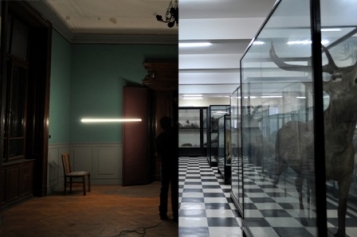
MAR 12 2013 - Maruchy León
MAR 2 2013 - Guillermo Mora
ON PAINTING
ON PAINTING
[prácticas pictóricas actuales... más allá de la Pintura o más acá]
Curated by Omar-Pascual Castillo
Opening 1st march 8:30 pm.
The first exhibition devoted to curatorial thesis proposal of the new artistic director of CAAM, take all the inside and outside museum space, receiving more than a dozen site-specific interventions in facades, patios, terraces and walls of the building, as well as relevant works on loan from more than ten private and institutional collections from Latin American pictorial context; territory where language and painting-as-art form has prevailed.
ON PAINTING is an ambitious exhibition project and reflection in which the painting is conceived, rather than as a genre of art, as a methodology, as a language.
The project will be accompanied by a theoretical event. Moreover, the CAAM will edit a publication with contributions of guest figures such as Barry Schwabsky, Kevin Power, Octavio Zaya and Omar-Pascual Castillo.
ENE 20 2013 - Teresa Solar Abboud
GENERATION 2013
07.02.2013 - 05.05.2013
GENERACIÓN 2013
PROYECTOS DE ARTE CAJA MADRID
Opening 7th february 8:00 pm.
Winner artists:
Elena Alonso, La Tapadera
Irene de Andrés,Festival club
Manuel Eirís
Santiago Giralda, Rendering Landscapes
Juan López,castiga el pladur
Asunción Molinos
Guillermo Mora,Pentapack
Teresa Solar, Doble mordido
Julia Spinola,Frase(Objeto)
Martín Vitaliti, #17
ENE 11 2013 - Guillermo Mora
DIC 8 2012 - Hisae Ikenaga
Do in the everyday life
Madrid based half Mexican and half Japanese artist, presents
processed industrial made objects to create contradictions in their functions.
She has a constant will of transformation to point out the processes in the materials.
In some of the works she propose the use of ¨global objects¨, objects purchased in world
wide chain stores, to manipulate, arrange their parts in different ways and create new
opinions about everyday life circumstances. The instruction manuals of these objects are
also used to open new windows to see transformations on paper
Ana Roldán exposure participates in Act One
Tamayo Museum. Mexico df. Curated by Andrea Torreblanca.
31/08/2012 First Act takes as its starting point the time to raise the curtain on the reopening ceremony. First Actopretende, through the social and political aspects of the event, questioning the role of the museum in relation alespectador, artwork, space and criticism. By employing rhetorical elements own lapintura history and theatrical, like the mirror and the curtain is intended to reflect the link between the expectations created before any act or statement and what is the moment of truth on these scenarios. Moreover, in several works criticizing and questioning the institution as a system that exerts its power over public opinion in defining specific structures of understanding and interpretation of art.
The exhibition involved the following artists: Mark Benson, Stefan Brüggemann, Andre Cadere, Mariana Castillo-Deball, Tacita Dean, Thomas Demand, Ceal Floyer, Lucio Fontana, Andrea Fraser, Douglas Gordon, Jonathan Hernandez, Adad Hannah, Fritzia Irizar, Adriana Lara, Natalia Martinez, Nils Nova, Goran Petercol, Wilfredo Prieto, Ana Roldán, and Pablo Vargas Lugo SUPERFLEX. Exhibition curated by Andrea Torreblanca, Associate Curator at the Museo Tamayo.
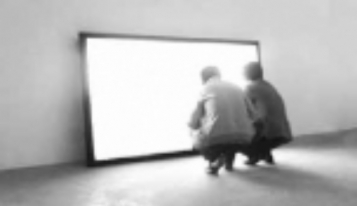
OCT 20 2012 - Guillermo Mora
Noestudio presents Sean Edwards, L. Marcellvs And Guillermo Mora.
Curated by Tiago Pinto de Abreu
This exhibition has emerged from dialogues-both oral and written, developed in 2012 - which were built artistasy distance between the commissioner. Only one of his works, Robe (2011) of Marcellvs L., alproyecto previously existed and the engine is noisy Noestudio.Cada estaexposición in one of the dialogues was recorded for crearuna digital memory plus memory naturalde participants because humanoscambian memories constantly in subtle ways. "Recently, neurophysiological studies handemostrado that whenever realizasinapsis alters brain, which appears to confirm that lines nohay permanently fixed in the brain." Laesencia same memory is subjective and not unasimple mechanical reproduction. In fact, the mundoque see, hear, feel, are inventions denuestro brain. "Colors do not exist as such, are only human inventions" 2. Rosenfield conIsrael conversation about laexposición works and new studies cerebroy memory. The first point of contact between lasobras color is vibration that is emitted porellas. In the specific case of the work Robe (2011) there is a movement generation tireless denuevos colors. The video, filled with a fisicidadescultórica, presented in a decontextualized, a fishing net in the port of Reykjavik (Iceland), being collected from a boat after demeses at sea. Sean Edwards works yGuillermo Mora were nourished from a cross between the presence of pre-existing laexposición this engine, the dialogue between them and lascaracterísticas space. Guillermo has colgadoen the roof between you and me (2012) 2. Work done withthe help of the Ministry of Education, Culture yDeporte., A long line of racks enroscadoscreando an abstract body espacioinestable scanning the top, while the work of Sean dael rate exposure models making each objects arranged on the shelf that bisecaa Noestudio, make a nod to the oral dialogues with participants yescritos maintained.
The obrasjuegan with gravity and its relation to the notion of equilibrium suelodesestabilizando of obrasy / or viewer. The meeting suamplitud understood, is the raw material of the three artists and armed to the meeting elescenario ofreceformas not fixed, immutable or fosilizadas.Las works microcosm in themselves, together creanuna platform that serves as a source of nutrition alespectador; mechanisms tireless continúanbuscando, building and producing within one decade of us feel uncomfortable quees inability to fully understand larealidad. The future publication and this exposicióntienen the aim of bringing the viewer and their obras.1 losartistas. - Conversation with Israel Rosenfield about works dela exposure and further studies on the brain and memoria.2. - Constructed using the help the Ministry of Education, Culture and Sport.
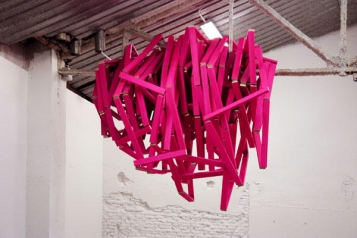
SEP 14 2012 - Teresa Solar Abboud
ICEBERG. The context as starting point
TERESA S, ABBOUD.
In this work different photographs taken by tourists at Los Gigantes
beach, in Tenerife, are projected. The portaits of the tourists remain
focused on the small screen, while the seascape, stays unfocused in the
back.
The context is developed through a succession of actions occurring in a given space and time. The result is something unique and unrepeatable.
ICEBERG #1 is a project that has been developed through an exhibition accompanied by a publication, which seeks to propose a reflection on the current context of Madrid through the work of 17 artists, who share a space and time.
ICEBERG #1 has been conceived as a starting point from which to begin a critical dialogue.
It plays with the characteristics of an iceberg as something that is constantly moving whilst only having a small part of its total volume visible. This project aims to bring together fragments of artistic practices in Madrid, where diverse characteristics are generated within similar circumstances. An iceberg is also impossible to map, as is the overall art scene of the city.
This project is not intended to define the art scene through a selection of artists, but only to think about the foundations of our current context. The artists in this show have been brought together in the interest of focusing on diverse points of action that converge into the same panorama and to highlight the links and connections in the work of: Julio Adán, Elena Alonso, Irene de Andrés, Ignacio Bautista, Ignacio Chávarri, José Díaz, Carlos Fernández-Pello, Theo Firmo, Cristina Garrido, Karlos Gil, Cristina Llanos, Almudena Lobera, Nacho Martín Silva, Alfredo Rodríguez, Teresa Solar, Luis Vassallo and Françoise Vanneraud that produce the aforementioned context.
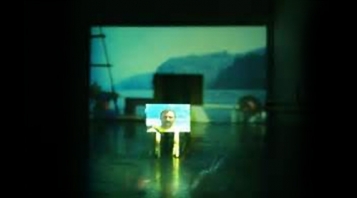
'Black mirror', the new work of Ana Roldán
Ana Roldán (Mexico City 1977) opens its first exhibition in Spain in the gallery FORMATOCOMODO under "black mirror" add works as, "Different Orders" (2012) "Form and Functions" (2011) among others. Currently involved in the show "First Act" at the Museo Rufino Tamayo in Mexico City and Surplus Authors Falke Pisano writte de With in Rotterdam.
JUL 5 2012 - Guillermo Mora
'Make Failure'
Curated by Daniel Cerrejón, Inéditos winning project.
The exhibition is centered around the practices of artists who have sought the failure of an active form. The exhibition presents a multifaceted view by artists of different generations and backgrounds with a vital relationship with Spain.
Works by: Wilfredo Prieto, Guillermo Mora, David Bestué, Fermin Jimenez Landa, Ignacio Uriarte, Jaime Pitarch, Chus Cortina, Carla Farren, Raul Gomez Valverde, July Falagán, Isidoro Valcárcel Medina.
The jury this year was composed of D. Alessio Antoniolli, Director Triangle Network & Gasworks, Ms. Katya García-Antón, curator of the Spain Pavilion at the Venice Biennale and Ms. Carolina Grau, independent curator.
The Burning House
Round Valencia 2 - 28012 Madrid
www.lacasaencendida.com
MAY 12 2012 - Joaquín del Palacio Kindel
LO POPULAR DEPURADO de KINDEL
FORMATOCOMODO presents for PHOTOESPAÑA2012
Opening Tuesday June 5 at 20 h, 2012.
Kindel Joaquin Palace (Madrid 1905) considered photography as the result of the artist's eye that fired his machine when he saw something he liked, he was more interested in the light of the image photographed scenes themselves.
"It's a matter of looking and shoot when you like something so special, no more mystery. Light is very important, as in painting. The technique is the least "
Kindel offers in secret that which does not display and offers us a secret hidden beauty and wondrous than anyone knows and stays in adversity.
Self-taught photographer, rejection join any group, but was unrelated as magazine photographer in the fifties architecture with cutting-edge architects. After the Civil War began his professional photography work in Devastated Regions, then went to work for the Department of Tourism.
In this exhibition included in the festival PHOTOESPAÑA Off 2012 "popular debugging" present a randomly selected photographs of large file that is the legacy of Kindel. His work was defined as Alejandro de la Sota: ... "The popular debugging exornación stripped of all vulgar, is a mine of discoveries and surprises."
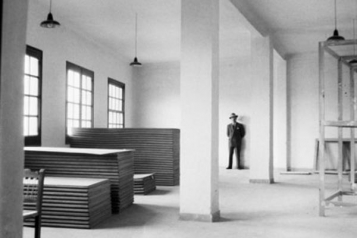
DIC 15 2011 - Guillermo Mora
EL RANCHITO
Subir para bajar, Guillermo Mora, El Ranchito, Matadero Madrid, 2011
Matadero Madrid
Nave 16
Paseo de la Chopera 14 - 28045 Madrid
www.mataderomadrid.orgEl Ranchito is a research-formatted cultural project, sponsored by Matadero Madrid and supported by other artistic professionals in the city. It is comprised by a section dedicated to reflection, a residency and scholarship program, a section for public presentation and a satellite activity program.
From November to April, El Ranchito will organize a public presentation- an expository phase that will allow the public to take a look at the research done up until now. The presentation will be housed in Nave 16 at Matadero Madrid, a 4,800 sq. meter space where the guest artists and collectives will display their work: the process used and the final results. This is a great collection and an even greater chance to get to know El Ranchito.
MAR 18 2011 - Hisae Ikenaga
SISTEMA METRICO. From 18 of march to 22 of may
The project reflects on how common it has become to read or hear references to sports playing fields for measuring large surface areas in the mass media. But what are the real dimensions of a football pitch? Different people use their own methods to measure surfaces: they make reference to everyday objects that maintain no relation with the established decimal metric system. This time, Ikenaga measures the area, the perimeter, the height and the volume of the Abierto X Obras space, using a football pitch, a person, a pile of furniture and smoke machines as references, so that one might appreciate the magnitude of private space surrounding us.
SISTEMA METRICO CAMPO DE FUTBOL
HISAE IKENAGA
From 18 of march
to 22 of may









